#in my head marie is talking to oscar about arthur
Explore tagged Tumblr posts
Text
Christmas work doodle




#john is a little nervous about wrapping presents#in my head marie is talking to oscar about arthur#also the “kayne :D you're here! :D finally after all these years! :D”#the delivery is just#mwah#chefs kiss absolute perfection#artists on tumblr#malevolent podcast#malevolent#sketches#arthur lester#john doe malevolent#arthur lester malevolent#oscar malevolent#marie malevolent#john doe#kayne!!!!!#kayne#kayne malevolent
28 notes
·
View notes
Text
malevolent 80’s au— where my sanity hangs by a goddamn thread (Season 3/4 ramble)
Arthur finds a book in the Cummings house and learns about ‘spots’ in the city where a God’s power is strongest, including most of the entrances to the other realms.
The way to breach the Dark World is through a doorway in caves underneath the city. The entrance is protected by the Larson family.
Wallace had been on Roland’s case about ‘poking into matters that weren’t his business’ and is kind of a guardian for all gods, believing them all to be equal. He is told of Arthur and attempts to keep him in the Larson estate.
Arthur escapes and heads into the caves.
Alongside this, Parker and John bond in the Dark World and keep each other from forgetting their pasts… though they end up getting separated for an indeterminate amount of time and Parker forgets who he is.
Arthur opens a gate to the Dark World, reunites with John, and they find Parker all fucked up. They both talk about their problems as a way to jog his memory, and they both might cry idk. Then they leave and are free to go.
The trio learn of Larson’s connection to a collection of cults and his sacrificing of his children and wife. Arthur vows to kill the man, though a sweep of the house turns out he left.
They find out he’s heading to New York.
In New York, Larson works along the Order of the Blood Sigil, which worship the party-loving yet all powerful Kayne. Kayne offers Larson a ‘guard dog’ in the form of Butcher, who hunts down Parker and Arthur.
Arthur learns that a ‘spot’ is in New York— a giant shopping mall belonging to Kayne. He thinks Larson may be there, before they are ambushed in the train they are on. Wacky escape method here.
They rent from Marie, and Parker decides to head to the library while Arthur naps.
Parker meets Oscar (who’s a Catholic librarian, not a priest in this) and Arthur meets Mr. Scratch. Though it turns out that Scratch is only interested in tormenting Arthur, not being set free, as it has a suitable host already.
Parker lets spill that he’s renting from Marie, and Oscar tells him that he’s found Hattie, who had been missing until recently. Parker returns Hattie home to Marie, with Oscar by his side.
Arthur recognizes Oscar as the man alongside Scratch, who watched the events of his nightmare unfold alongside the entity. Unfortunately Oscar does not know him.
Arthur figures out its a similar situation to him and John, so they go to a spot to try and split Scratch and Oscar apart, whose grip on one another is weaker and more voluntary.
Scary bugs in the walls, but Oscar is okay. The ritual does not go off without a hitch, as Oscar loses his hearing from Scratch’s scream.
They go to a hospital to treat his wounds, only to rerun into the Butcher. Luckily, Charlie spotted Arthur and followed him, saving him from Collins.
Charlie, or Noel, wishes to help the trio, and they say goodbye to Oscar, reluctantly. A bit of jealousy ensues between Parker and Charlie, but nothing too crazy.
Charlie tells them about the cult, and a sort of password they need, so Parker and Arthur do reconnaissance.
Charlie talks with the Butcher and learns about the man’s debt to Kayne, after the being took pity on him during a hunt where he REALLY underestimated his prey. (Earlier years and all)
They bond over scars(scars inflicted by gods in this AU become tattoos. Kayne’s tattoos: hearts, blood, roses, fruit. KiY’s tattoos: yellow flowers, teeth, bones, tentacles, cartoon stitches. Scratch’s tattoos: eyes, bubbles, clouds, sparkles, random patterns)
The trio reports back to Charlie and Collins, and they arrive at the order meeting. They are having a special presentation of the Graystone, and it’s the best time to infiltrate.
But Larson weeds them out. He has a grand plan to remove John from Arthur AGAIN and return the King to his former glory. But obviously that doesn’t work.
Everyone survives the battle, if not for a few awful wounds. Parker loses a hand, for example.
Kayne watches them leave, uninterested in stopping them, since there is no such thing as BAD chaos. While he plots some more fun he intends to have with them, Kayne arrives and slaughters the living bejeezus outta him.
#malevolent podcast#arthur malevolent#kayne malevolent#parker malevolent#oscar malevolent#noel malevolent#the butcher malevolent#larson malevolent
11 notes
·
View notes
Text
Chazzawrites Challenge
Day 20.- What are your favourite books/authors?
I appreciate that this question is in plural, cause yeah there's no way I can pick just one.
This is ended up being REALLY long so I'll put it under a cut
First, let's talk about books!
Frankenstein is one of my all time favourites. I love how different it was from what I had in my head before reading it, cause we all know this story of the monster who torments the people of a town, but in reality it's not that much of a horror story, it's a tragedy. The tragedy of Victor who doesn't know when to stop, and the tragedy of the creature who was dammed to be alone forever. It's such a good story to show how horrible lonliness can be and how blame gets twisted, creating a circle of non stop revenge. More than anything, I love how human the creature is despite their inhuman nature, which shows that humanity is a thing that's gained, not born with. Since you gain it, you can lose it, and there are times where Victor loses his, and sometimes you can't say which is the human and which is the monster. 10/10, would totally recommend, a must read for everyone.
I don't think I've said this before, but I'm a BIG FAN of Jules Verne. I haven't read all of his works yet, but To the Moon is one of my favourites. One thing I love about his writing is that he shows you the actual calculations amd mechanisms of the machines he creates (long live sci-fi like this) and the book is just filled with mathemathics from begining to end. I don't like nor do I hate math, but since I used to be very good at it when I was younger it was always a pleasure to follow the problems along the characters. The plot is very different from his other works: there's no real sense of danger whatsoever at any point, but it clearly doesn't need it. I also love the fact that the book actually helped the NASA creation and scientists to launch the first rocket to space, it's such an amazing bit of history.
Sherlock Holmes, just all Sherlock Holmes in general: Study in Scarlet, The adventures, The Baskerville's Hound, the case of the redhair's club, of the lady and the translator, the whole thing with Moriarty, eveything is just *chef's kiss*. The mysteries and the way they are presented, easy and simple, as well as the super charismatic characters is what makes me love Doyle's writing. Holmes and Watson are the reason why the trope of the dynamic duo is one of my favourites, too. I like how many adaptations there are of SH as well, they're always so fun to check out.
Finders Keepers by Barbara Nickolae has a special place in my heart cause it's the novel that made me want to become a writer. A detective mystery that becomes a murder mystery and that had me literally holding my breath near the climax, is nothing out of the ordinary, and yet is such a good book.
Red Rising is a trilogy by Pierce Brown, and its my favourite YA saga. The Hunger Games is good but the end was really flat for me, Divergent and Maze Runner both progressively get worse when I read them, and I tried to read other sagas but just couldn't get into them. But Red Rising is everything I'd like in one. Each book is just, yes. Yesyesyes. A great first book, an amazing sequel and an ending both thrilling and fascinating. Bloody and sentimental, complex and wholesome, dramatic and at times hilarious, I absolutely love that trilogy. As many dystopian sagas, it touches themes of abuse of power, corrupted systems and a revolution to stop them, but does so in a way that's different from any other sagas I've seen: it understands and tries to change that system from the inside out. It also has Sevro, my favourite fricking best boi gremlin in all literature, so that's a plus.
Now, about authors!!
Mary Shelley, Jules Verne and Arthur Conan Doyle are obvious, as well as Pierce Brown. I'll add here Fitzgerald for his amazing work in The Great Gatsby, and Oscar Wilde for literally any of his works. To show off some of my country's writers, Juan Rulfo, writer of Pedro Páramo, is my pick. And since we're talking about authors and not books I'll add Eiichiro Oda, author of One Piece, my favourite franchise in the world.
3 notes
·
View notes
Text
Mother’s Day
Summary: Six snapshots of three Mother's days across the years.
2005, Edinburgh, Scotland Henry's got his mum's hand in one of his and a massive picnic basket he'd insisted he could carry in the other. Bea and Philip have run ahead, and Henry's starting to envy their freedom, but he refuses to make their mum carry a picnic basket on a day that's supposed to be all about looking after her. But then he feels a hand in his hair, and another taking the basket for him, and he turns to see his dad, an easy grin on his face and his guitar slung over his back. "Look at you, all grown up and helping your mum. Were you good for her today?" Henry beams. Arthur's been out on a set for hours; he's still got bits of makeup on his face and some product in his hair. Henry thinks it makes him look like a superhero. "I was really, really good!" "Is that right? Cat, was Henry really, really good today?"
"He was," Catherine says, grinning. "All three of them have been wonderful. They were all big helps getting things ready for our picnic."
Henry grins, and newly freed of the weight of the picnic basket, he runs up to join Philip and Bea while his parents share a kiss above his head. Catherine calls to them to stay within eyesight as the family make their way out of Holyrood and up toward Arthur's Seat. The kids fall back a bit as it gets steeper and they get tired, but they make it to the top of the Salisbury Crags and Arthur lays out their picnic while the kids pick flowers, Bea and Philip handing their considerably larger boquetes to Henry so that he can be the one to present them to their mum. After dinner, Arthur gets out his guitar and plays, cycling through some of Catherine's favorites and teaching the kids "Loch Lomond" so they'll be ready when they visit the loch tomorrow. As it starts to get darker, they pack up and finish the climb to the top of Arthur's Seat, and Bea takes pictures of their parents, then a PPO takes pictures of their family as the sun sets behind them, and Henry is so happy he can hardly believe it. 2005, Washington, DC Alex is awake first, and for a second, he's not sure where he is. It's brighter than his bedroom, with whiter walls and a window without any real curtains yet. But then he rolls over, and June is still asleep in a twin bed across the room, and the cars outside are too loud, and it all comes back. They're in Washington, DC. They're visiting their parents for Mother's Day, and they're going to see all the places they work, but first, he and June have something planned. He hops out of his bed and into hers, shaking her awake despite her grumbles. "June! June, June, June. Get up, get up, get up. We have to make breakfast!" Their dad has promised to help them if they need it, but Alex and June decided last night that, at eight and eleven, they're grown up enough to do it themselves. Alex has been helping his dad pour and flip pancakes since he could reach the griddle, and June's been sitting on the counter pushing oranges into a juicer for as long as he can remember. Between the two of them, surely they can put something together. When Oscar comes in, he finds the kids in the middle of a whispered, but very heated, discussion about what exactly the instructions on the side of the box mean. They're both furiously mixing their own pancake batter in different bowls. June's looks better, but Alex refuses to give up. Oscar just laughs, and he helps fix Alex's so that it looks right, and then Alex shapes and flips pancakes while June makes orange juice and Oscar makes bacon and coffee. June finds a tray and she puts a yellow rose on one corner to make it look pretty. Once everything is assembled, Oscar disappears upstairs to make sure Ellen is actually in bed when the kids come to "wake her up" with breakfast in bed. She's been awake for a few hours at least, answering emails and drafting meeting agendas, but she can climb back into bed and let the kids think they've surprised her. Oscar snaps a picture of the three of them, Ellen grinning with a kid under each arm and the breakfast laid out in front of her, and it all feels perfect. 2020, London, England
Mother's Day is rainy, but that feels right. Henry writes a card for his mum, and they all have lunch together, but it's not right. Mother's Day used to be a day Arthur would always make sure he wasn't working, and he'd plan them something fun and exciting to do. But now, Catherine doesn't want to visit the London Eye or go to Holyrood or even take them to the V&A. She just wants to have a nice family lunch, so they have one, and Henry takes the barbs from Philip and his gran so that he doesn't ruin things for his mum. She wants them to get along for the day, so he doesn't fight back. He sits, and he's civil when Philip suggests casually that the public might be excited about a new royal suitor, and how great it would be for their public image if either Henry or Bea started dating. Henry sits quietly while his gran hints that he's been taking a bit too long to decide what to do with himself, and Philip all but outright says that he should be enlisting soon. He sits, and he eats his food, and he resists every urge to fight back or argue.
But after lunch, when their mum's back in her room and Philip is headed back to Anmer, Henry and Bea find their way to the music room. Bea gets her guitar, plucking out a few chords of "Loch Lomond" as Henry settles on the other end of the sofa with his phone. She hums what should be the lyrics "I'll be in Scotland afore you/ but me and my true love will never meet again", and Henry pretends he doesn't know the words. A few minutes of quiet chords later, he looks up from his phone to say, "hey, Bea? Happy Mother's Day. I... I know you didn't really ask for any of this, but I'm... you've been sort of a mum for me for the past few years, and I... I really appreciate it. I love you."
She puts down the guitar to hug him, and he asks, "do you think Mum will get better?"
"I'm... I'm not sure. I hope so. But we've got each other, alright? Whatever happens."
He nods, and that night, they sneak out together to eat Jaffa cakes and Cornettos in a courtyard outside the V&A. Bea brings her guitar, and she plays their parents' favorites, and Henry hopes that wherever their dad is, he's doing something special to help their mom feel loved.
2020, Washington, DC
Alex and June are planning on a traditional Mother's Day, one where they make their mom breakfast and she pretends to be surprised. But Alex is mid-pancake when Ellen appears in the kitchen to grab a muffin and tell them both she loves them and she's sorry, but something's come up and she's got to take a video call. She'll be ready for breakfast as soon as she can be, and she'll meet them when she can.
After an hour, Alex and June eat cold pancakes with warm orange juice alone. June's trying to be happy, but her mouth is doing that thing it does when she's disappointed, but not surprised. Alex is used to that look being directed at him after ignored texts and too-late nights. But it's Mother's Day, and they should be happy, even if their mom is busy. So he picks off the thorns and tucks the yellow rose behind her ear, then he steals her coffee and pancakes to put them on the tray and carry everything out to the Truman Balcony, June following him with half-hearted complaints. When their mom and Leo join them half an hour later, they've saved some pancakes and juice, and Ellen gets to spend at least half an hour as a mom before she's called back to the presidency, Leo promising her a nice dinner if she can find time in her schedule.
At least it's better than last year. Last year, Ellen had been pulled away from breakfast the moment she'd sat down and had been busy for the rest of the day. June had been upset for the rest of the day, and Alex had had to try and keep her company, at least, and the whole day had been hard. Mother's Day has been hard for the past few years, more about finding a semblance of family time than about actually celebrating their mom. But they've found some time today, and June's still smiling, and Leo looks proud and their mom doesn't seem to stressed. So, all in all, it could be worse.
2025, London, England
Tradition demands that they invite Mary to their Mother's Day brunch, so she is invited. She comes, and Alex thinks it might just be to spite them. But after the brunch, she's complaining about her joints. She goes back to Buckingham, and the Fox-Mountchirsten-Windsor children are urging them all into a van, sharing conspiratorial glances and grins as Philip talks to a driver and Bea pulls out a blindfold.
"Mum, we've got a surprise, so we're going to blindfold you after a bit, alright?" Catherine laughs and agrees, and Alex looks at Martha, who looks just as surprised as he is. Philip reveals a blindfold for her, too, arguing that since she's pregnant, she's technically a mother and deserves to be celebrated as one. Catherine agrees immediately, grinning at Martha. So, an hour and a half later, the moms are being blindfolded, but Alex is free to look out the window as the ban pulls into a small seaside town. They drive through it, stopping to park near a beach. Henry takes his mom's hands and Philip takes Martha's as Bea hands Alex a picnic basket, and they make their way to a picnic table on the beach before the blindfolds are removed. Catherine sees the picnic basket, and she grins.
"We... We thought maybe we could go for a hike, since that's what we always did growing up," Henry says.
“It’s not a long one, but Mazzy, if you’re not feeling up for it we’ll stay in town and enjoy the beach, or we can only go part way,” Philip says.
“Happy mother’s day, Mum. It… it’s good to have you back, and we love you,” Bea tells her.
"And you too, Martha. You're the best decision Philip ever made," Henry says, and Philip nods, wrapping an arm around her waist and kissing her cheek, then the baby bump just starting to make an appearance against her shirt. They have a happy lunch, one where they're not all being careful to do things just right or keep an uptight grandmother happy. Then, Martha feels alright to hike, so she and Philip join them. They take things slowly, resting at a halfway point for Bea to play guitar and the six of them to take a break, Philip making sure Martha's doing alright and Henry passing out some of the treats Alex's family sent with him. And it's good. It's really, really good.
2025, Austin, Texas
Alex wakes up early on Mother's Day in his childhood home, wrapped around Henry in a bed that's probably too small for the two of them to share. He can hear June's alarm from across the hall, and he knows it's time. He presses a kiss to Henry's forehead, then gets up and meets June in the hall, both grinning. This is the first Mother’s Day where they get Regular Mom instead of President Mom, and they’re going to make it the best Mother’s Day yet.
Breakfast is routine by now; Alex starts pancake batter while June squeezes orange juice, then moves on to cooking eggs and bacon as Alex flips pancakes on the griddle. Henry wanders into the kitchen, talking on the phone as he wraps his arms around Alex. The coffee's ready, and there are three stacks of pancakes: blueberry, chocolate chip, and plain. Their mom will take one of each, and Leo will refuse anything but plain while Alex takes chocolate and June does blueberry. Alex wonders which one Henry will pick, thrilled that his boyfriend gets to join them. He's not sure who decided that England and the US should have different Mother's Days, but he's glad.
"Good morning," Henry says, hanging up and pressing a kiss to Alex's forehead.
"Morning. Things going alright at the shelter?" Henry's arranged to have moms who can't be with their kids visit the youth shelter today, to love the kids a little extra and get loved themselves. He’s left Pez in charge of it, and apparently, it’s all off to a good start.
When breakfast is ready, June brings over the tray with servings of eggs, bacon, juice, and coffee, complete with the yellow rose. Alex adds a plate of their mom's favorite pancakes, then he and Henry grab the rest of the food and bring it to their mom's room, where it's been Leo's job to make sure she actually relaxes this morning. She'd jumped into charity work the minute she left office, and they've all agreed she deserves to take a break for once. She doesn't know it, but she and Leo are going on vacation tomorrow, and he and the kids are refusing to let her bring any work with her. She’s been working for eight years straight; she deserves to relax for a bit.
She pretends to be surprised about the breakfast as the kids find spots around the room to settle down so they can eat together. Ellen's relaxed for the first Mother's Day in eight years, and she's going to spend the whole day with them for the first time in ages, if ever. They're planning on a day in, full of card and board games. Alex is going to help her grill for dinner, and they've all made a pact not to wear anything but pajamas all day. And, for the first time since she was president, Alex is convinced it's going to be a good Mother's Day.
On AO3
Notes:
Earlier today, I was like "yeah I kinda want to write a parent fic but I don't know", and then the discord chat (especially Gina over at @saltfics) was like "DO IT" and so I ignored my final essay and did this instead. -
Want to support the Hannah Makes Art fund? You can tip me a ko-fi here!
#rwrb#red white and royal blue#henry fox mountchristen windsor x alex claremont diaz#alex claremont diaz#henry fox mountchristen windsor#rwrb fic#my fic: rwrb#firstprince
61 notes
·
View notes
Text
MARILYN MONROE
June 1, 1926 - August 4, 1962
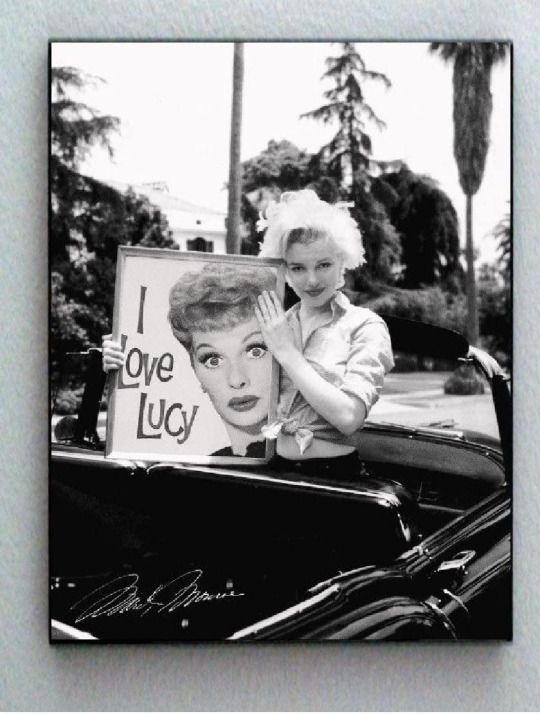
Marilyn Monroe (born Norma Jeane Mortenson) was an actress, model, and singer. Famous for playing comedic "blonde bombshell" characters, she became one of the most popular sex symbols of the 1950s and early 1960s and was emblematic of the era's changing attitudes towards sexuality. She was a top-billed actress for only a decade, but her films grossed $200 million by the time of her death in 1962. More than half a century later, she continues to be a major popular culture icon.
"When I was five I think, that's when I started wanting to be an actress. I didn't like the world around me because it was kind of grim, but I loved to play house. When I heard that this was acting, I said that's what I want to be. Some of my foster families used to send me to the movies to get me out of the house and there I'd sit all day and way into the night. Up in front, there with the screen so big, a little kid all alone, and I loved it.” ~ Marilyn Monroe,1962

Lucille Ball never worked with Marilyn Monroe, but meet her in 1953 at Ciro’s Nightclub on Sunset Strip, along with Betty Grable, and Red Skelton. Monroe’s immense popularity permeated Ball’s work none-the-less.
At the start of “Changing the Boys’ Wardrobe” (ILL S3;E10) the gang is heading to the movies to see “That picture we’ve been trying to get to for weeks with Marilyn Monroe.” The movie is likely Gentlemen Prefer Blondes, which premiered in New York City in July 1953. On November 5, 1953, the same day the episode was filmed, Monroe’s new film How to Marry a Millionaire was released in the US.
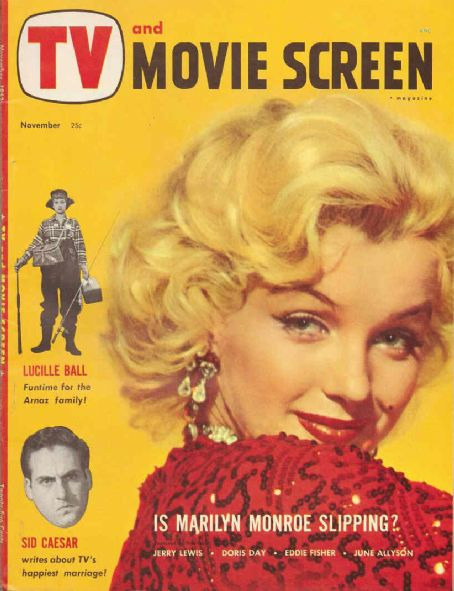
The November 1953 cover of TV and Movie Screen Magazine saw Lucy (in “The Camping Trip”) and Marilyn wearing the dress she wore on the May 1953 cover of Life Magazine promoting Gentlemen Prefer Blondes.
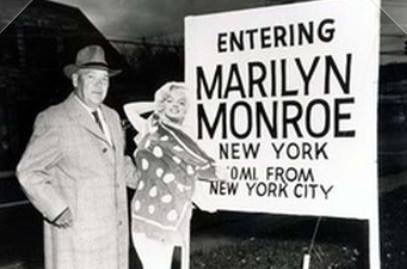
Also on November 5, 1953, the town of Monroe, New York (60 miles from New York City) was temporarily renamed Marilyn Monroe.

The film later inspired much of the plot of “Second Honeymoon” (S5;E14), Lucy’s failed attempt to make their transatlantic crossing to Europe more than just a working vacation.
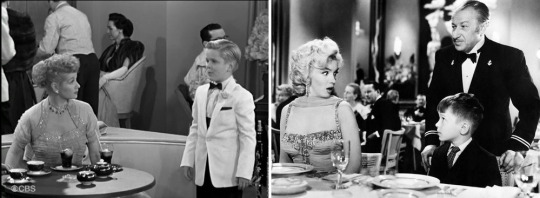
Monroe’s dinner companion turns out to be a seven year-old boy, just like Lucy’s ping pong partner turns out to be young Kenneth Hamilton (Harvey Grant).
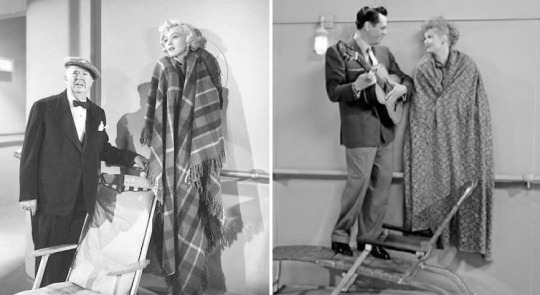
Lucy gets stuck in a porthole just as Monroe did, also draping a blanket around her shoulders so passersby wouldn’t know what was really going on.

The idea for the burlap potato sack dresses in “Lucy Wants A Paris Gown” (ILL S5;E20) comes from Monroe’s real life.
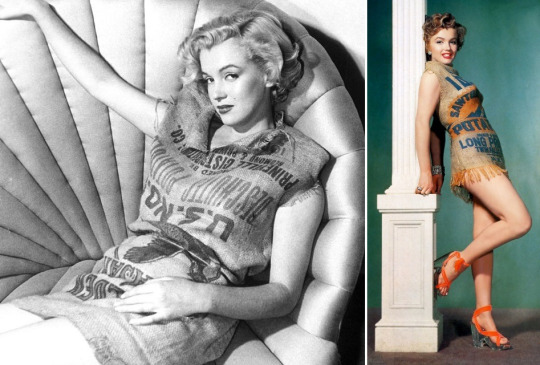
In 1951 Marilyn Monroe took a series of high fashion photographs wearing a potato sack as a response to a journalist who said that she might look sexier in a burlap sack than her usual fashion choices.
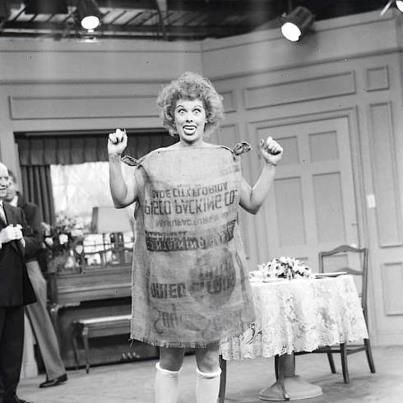
Lucy first wore burlap at the end of “Mr. and Mrs. TV Show” (ILL S4;E24) as her scary version of a Phipps make-over.

In “Ricky’s Movie Offer” (ILL S4;E5) Lucy and Ethel argue about who looks more like Marilyn Monroe.
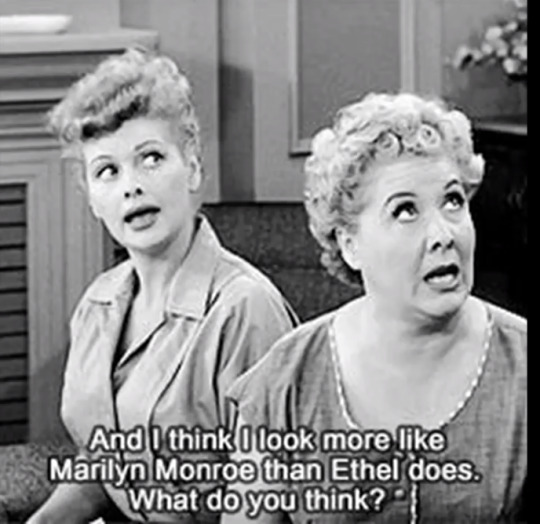
While Lucy has the facial features, Ethel has the blonde hair.

Fred (hilariously) settles the argument!
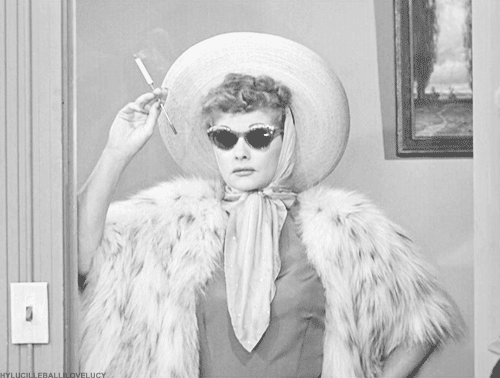
In “Ricky’s Screen Test” (ILL S4;E7) a long list of Hollywood names are dropped in anticipation of hobnobbing with celebrities, including Marilyn Monroe.
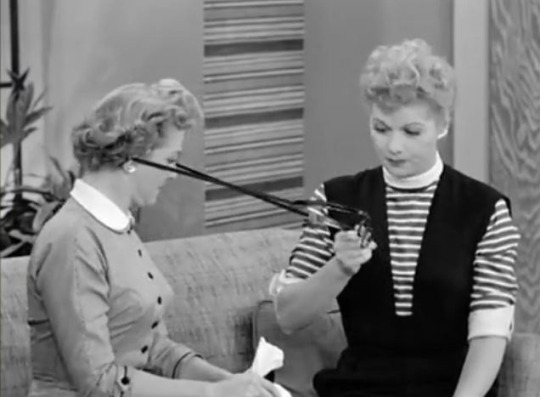
In “Lucy and Harpo Marx” (ILL S4;E28) Lucy wonders if Ethel might pass for Monroe to a near-sighted Carolyn Appleby. After Ethel tries to walk like Marilyn Monroe, Lucy decides that “nobody is that near-sighted!” Fred says that he looks more like Marilyn than either of them!
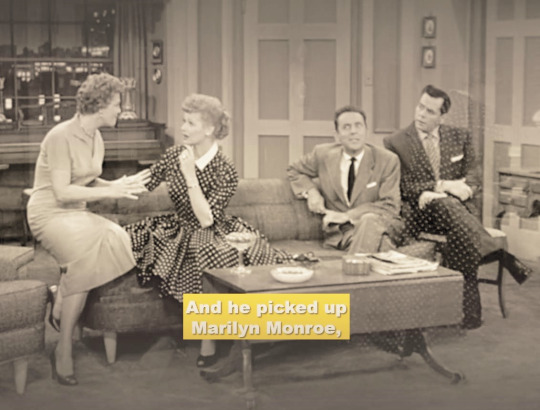
In “Lucy and Superman” (ILL S6;E13), the Appleby’s come over for a social evening that Ethel calls “the bore war” because the couples only talk about their children. As the scene opens, Caroline is in mid-sentence talking about a Marilyn Monroe film.
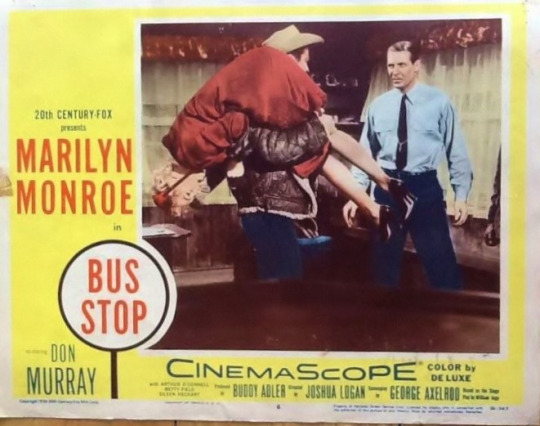
CAROLINE: “...and he picked up Marilyn Monroe, slung her over his shoulder and carried her off!”
Although the title is never mentioned, the film they are discussing is Bus Stop, starring Marilyn Monroe and Don Murray. It was released in August 1956, two and a half months before this episode was filmed.
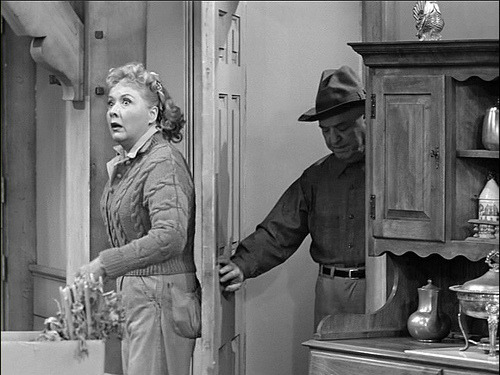
When “Lucy Does the Tango” (ILL S6;E20), she stuffs eggs down her blouse and Ethel stashes a some in her back pockets. Lucy tells her, “Whatever you do don’t try to walk like Marilyn Monroe,” but the ‘yolk’ is on Ethel when Fred suddenly enters through the kitchen door!
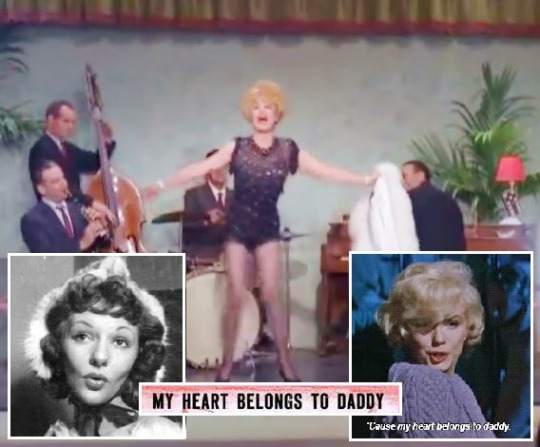
In “Lucy the Gun Moll” (TLS S4;E25), Lucy plays Lucy Carmichael and Rusty Martin. The name Rusty Martin was probably derived from Lucy’s hair color and the surname of Mary Martin, who introduced the song “My Heart Belongs to Daddy” (music and lyrics by Cole Porter) in the 1938 Broadway musical Leave It to Me. Marilyn Monroe sang it in the 1960 film Let’s Make Love. In that same film, Harry Cheshire, who played Sam Johnson in “Oil Wells” (ILL S3;E18), played Monroe’s father. Jerry Hausner (Jerry, Ricky’s Agent) and Joan Banks (Reporter Eleanor Harris in “Fan Magazine Interview”) played uncredited supporting roles.
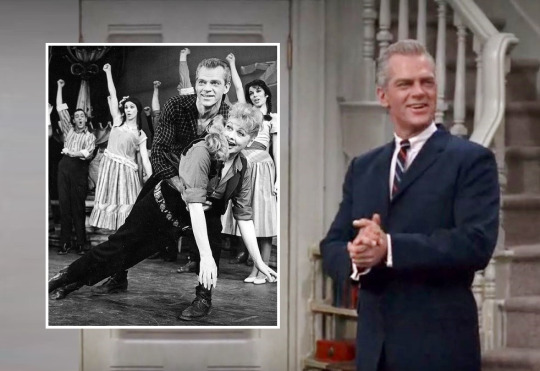
Lucy and Marilyn shared a leading man in handsome Keith Andes. Andes was Lucy’s male lead in Wildcat on Broadway, and later played was featured on three episodes of “The Lucy Show.”
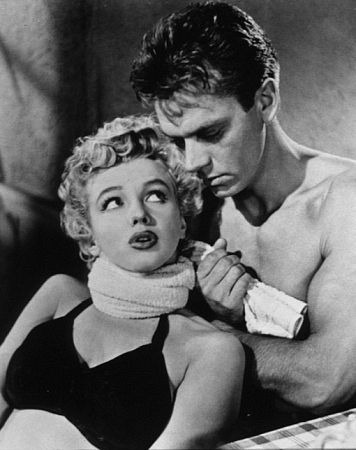
In 1952, he played opposite Marilyn in Clash By Night, an RKO picture.

In “Lucy Gets Ricky on the Radio” (1952), the June 3, 1952 of Look Magazine actually had Lucille Ball and Marilyn Monroe on the cover! Monroe was promoting Clash by Night, and Desi had written a feature on his wife for the magazine. So Marilyn actually did appear on “I Love Lucy” - if only in a still photo.
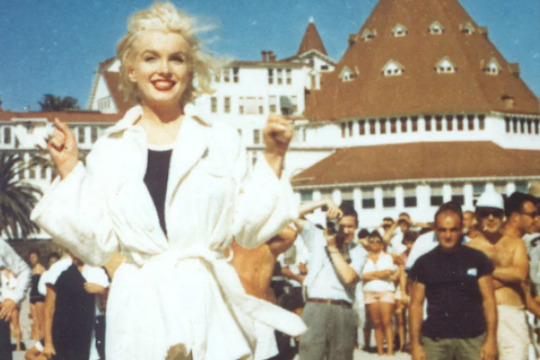
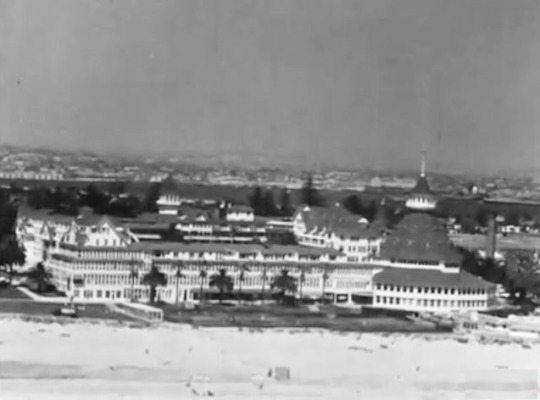
Some Like It Hot (1959) is arguably one of Marilyn Monroe’s most popular films. What does it have in common with Lucille Ball? In 1958, both Lucy and Monroe were depicted at San Diego’s famous Del Coronado Hotel. It is the hotel that the Ricardo’s and Mertzes stay at in “Lucy Goes to Mexico” (LDCH S2;E1) as well as the backdrop for much of the film. Although Desilu filmed establishing footage of the hotel, the cast stayed in Hollywood, while Monroe went on location (as seen above). In “Lucy Goes to a Hollywood Premiere” (TLS S4;E20), Mr. Mooney says he wouldn’t buy a second hand nightie if it had been worn by Jack Lemmon in Some Like It Hot.
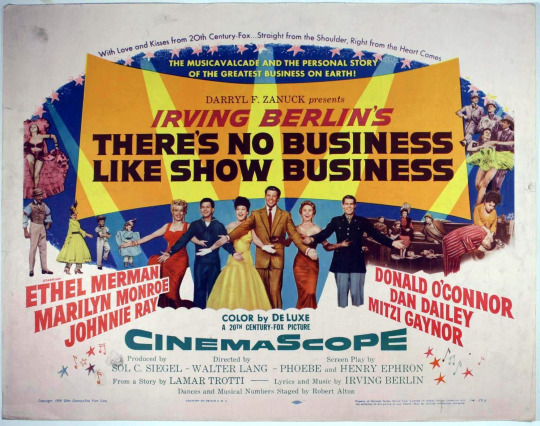
The Irving Berlin song “There’s No Business Like Show Business” was sung on “I Love Lucy” and “The Lucy Show.” Although it was originally from the Broadway musical Annie Get Your Gun (1946), it also served as the title and was performed (by Merman) in the Marilyn Monroe film There’s No Business Like Show Business in 1955.

In 1952, Marilyn co-starred by Richard Widmark (”The Tour” ILL S4;E30) in the film noir drama Don’t Bother To Knock. The film also featured “Lucy” players Lurene Tuttle (Fine Arts League President), Verna Felton (Mrs. Porter), Gloria Blondell (Grace Foster), as well as Harry Bartell, Olan Soule, Robert Foulke, and Bess Flowers.
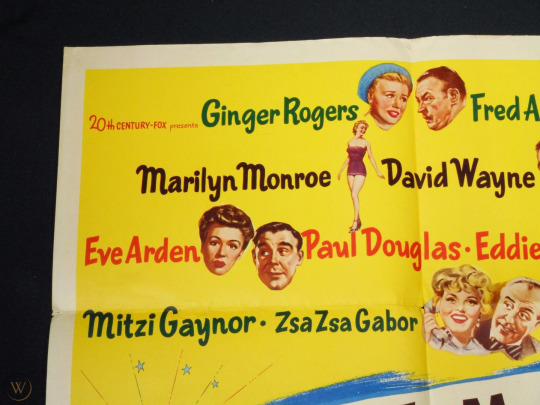
That same year, Monroe starred in We’re Not Married! opposite Lucy’s friend and former co-star Ginger Rogers, as well as Eve Arden (”Hollywood at Last!”), Paul Douglas (”Lucy Wants a Career”) and Eddie Bracken (Too Many Girls).
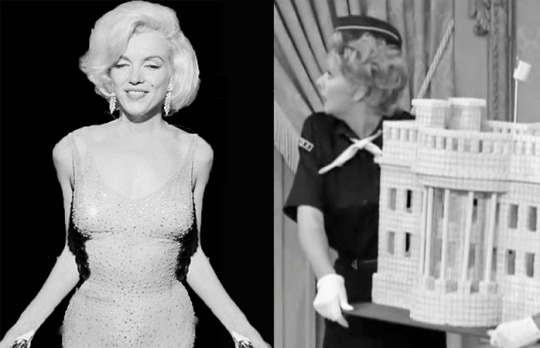
One of Monroe’s most iconic moments came in March 1962 when she sang “Happy Birthday” as a birthday present to President John F. Kennedy in a public birthday celebration also attended by Lucy’s friends and co-stars Jack Benny, Jimmy Durante, Henry Fonda, Danny Kaye, Shirley MacLaine and Elliott Reid. A year later, Lucy Carmichael also gave Kennedy a present, a sugar cube replica of the White House on “The Lucy Show” with Elliott Reid doing Kennedy’s offstage voice as well as playing a small on-camera role!
"I never quite understood it, this sex symbol. I always thought symbols were those things you clash together! That's the trouble, a sex symbol becomes a thing. I just hate to be a thing. But if I'm going to be a symbol of something I'd rather have it sex than some other things they've got symbols of." ~ Marilyn Monroe, 1962
Monroe was married (and divorced) three times:
James Dougherty, Merchant Marine & Policeman (1942-46)
Joe DiMaggio, Baseball Player (1954-55)
Arthur Miller, Playwright (1956-61)

In “Lucy is Enceinte” (ILL S2;E10), Fred gives Lucy a signed baseball for his future 'godson’. When he asks Lucy to read out the signature, she at first says “Spalding,” the ball’s brand name, but then finds it is signed by Joe DiMaggio.

In “Ragtime Band” (ILL S6;E21), Little Ricky asks his Uncle Fred:
LITTLE RICKY: “Who’s Joe 'Maggio?” FRED: “'Who’s Joe 'Maggio?’ You talk more like your father everyday.”
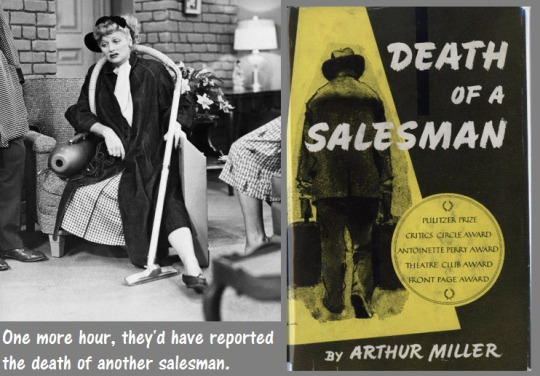
In “Sales Resistance” (ILL S2;E17), Lucy compares herself to Willy Loman, the title character in Death of a Salesman, a Pulitzer Prize-winning play by Arthur Miller first produced on Broadway in 1949 and made into an Oscar-nominated film in 1951.
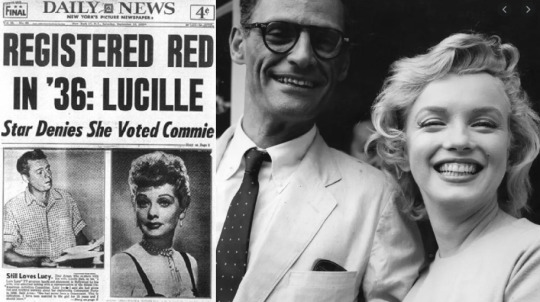
Speaking of husbands, Desi Arnaz has something in common with Marilyn Monroe, too. Both of their souses were accused of being Communists by the House Un-American Activities Committee during the 1950s. Both Lucille and Arthur Miller were cleared of charges and their careers continued, although that was not true for many celebrities of the time.
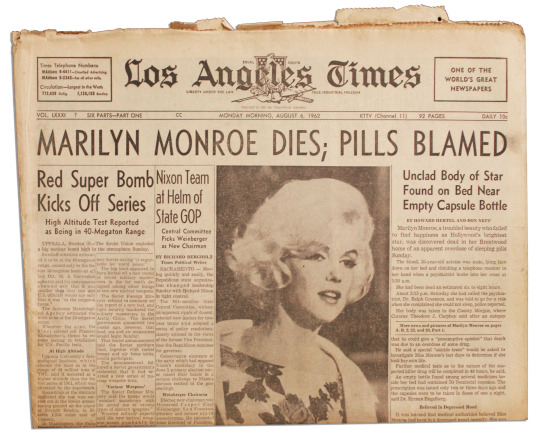
Monroe died on August 4, 1962. The toxicology report showed that the cause of death was acute barbiturate poisoning. Empty medicine bottles were found next to her bed. The possibility that Monroe had accidentally overdosed was ruled out because the dosages found in her body were several times over the lethal limit.
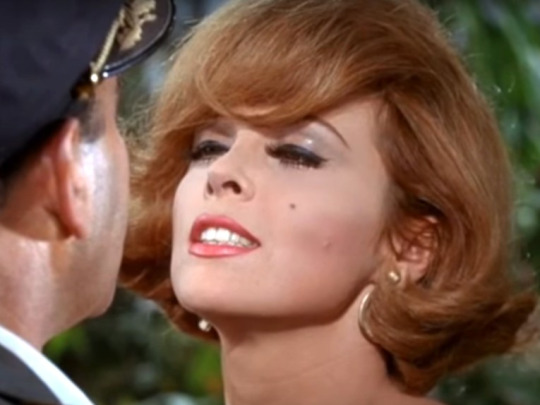
The character of Ginger, the movie star castaway on “Gilligan’s Island” (1964-67) was described during casting as a combination of Lucille Ball and Marilyn Monroe. Tina Louise had Lucy’s red (ginger) hair and Monroe’s shapely physique. The series also featured Natalie Schafer (Phoebe Emerson) as Mrs. Howell, and Alan Hale Jr. as the Skipper. Hale performed on “The Lucy Show” and “Here’s Lucy”. Series creator Sherwood Schwartz was a Lucy fan. His brother Elroy Schwartz actually wrote scripts for Lucille Ball.

In the 2013 web-series “Ryan & Ruby” both Lucille Ball and Marilyn Monroe are given special thanks for their inspiration. The last name of star and creator Ryan Burton's character is "Carmichael", the same as Ball's character on the "The Lucy Show". In Ryan’s kitchen there are fridge magnets with photos of both Lucy and Marilyn.
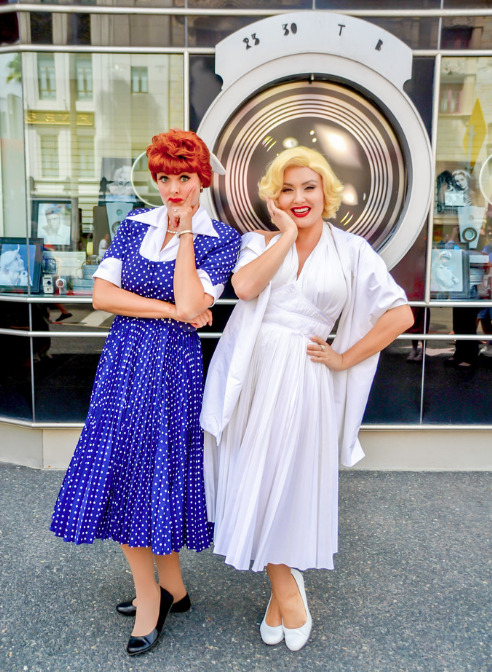
Lucy and Marilyn are street characters at Universal Studios theme parks, their iconic hair and costumes making them instantly recognizable.
The same day Marilyn Monroe was born in 1926, another Hollywood icon with connections to Lucille Ball was also born, Andy Griffith. To read his birthday blog, click here!
#Marilyn Monroe#Lucille Ball#I Love Lucy#William Frawley#Desi Arnaz#vivian vanc#the lucy show#Ryan and Ruby#Gilligan's Island#Tina Louise#Arthur Miller#Joe DiMaggio#Keith Thibodeaux#Alan Hale Jr.#natalie schafer#John F. Kennedy#Paul Douglas#Eve Arden#Ginger Rogers#Verna Felton#Ethel Merman#Richard Widmark#There's No Business Like Show Business#Hotel Del Coronado#Don't Bother To Knock#Some Like It Hot#Look Magazine#Keith Andes#Clash By Night#The Seven Year Itch
49 notes
·
View notes
Photo

The Longevity of George Segal by Susan King
Newer generations of audiences primarily know George Segal as a sitcom actor who played the publisher of a fashion magazine on the NBC comedy series Just Shoot Me!, and for the past six seasons, the amiable grandfather always eager to give advice on ABC’s The Goldbergs. But to baby boomers, he was one of top leading men of the 1970s. He may not have reached the heights of Burt Reynolds, Paul Newman, Robert Redford or Al Pacino during the decade, but nobody could do romantic comedy better than Segal. He was charming, adorable, sexy and a bit world-weary. Sort of a neurotic New York Jewish Cary Grant with a fabulous head of thick air.
Segal starred in such comedies as 1970’s WHERE’S POPPA? (the funniest scene is when Ruth Gordon pulls down his pants and bites him on the tuchus) and THE OWL AND THE PUSSYCAT, THE HOT ROCK (‘72), BLUME IN LOVE (‘73) and A TOUCH OF CLASS (‘73), for which he won the Golden Globe for Best Actor and his costar, Glenda Jackson, took home the Best Actress Oscar.
Segal, now 85, told me during an interview I did with him in 2011 for the Los Angeles Times at the famed eatery Musso & Franks that he had “no notion I was going to take a comedy direction.” In fact, one of his first major stage roles was in 1956 in Jose Quintero’s legendary off-Broadway production of Eugene O’Neill’s The Iceman Cometh, starring Jason Robards in his signature role of Hickey.

And when he began in features in the early 1960s, Segal starred in such dramatic fare as 1965’s SHIP OF FOOL; Mike Nichols’ superb WHO’S AFRAID OF VIRGINIA WOOLF? (‘66), for which Segal earned an Oscar nomination for supporting actor; the 1966 thriller THE QUILLER MEMORANDUM and that same year, CBS’ broadcast of Arthur Miller’s DEATH OF A SALESMAN.
Segal was also a popular guest on daytime and evening talk shows where he got to demonstrate his goofy charming side. He’d always bring out his banjo and sing the 1909 song “The Yama Yama Man.” Housewives and mothers—mine included—fell in love with him.
And so did director Jack Smight, who, Segal noted, thought he would be perfect for his 1968 dark comedy NO WAY TO TREAT A LADY. Segal was pitch perfect as Morris Brummel, a tough-nosed New York detective out to kill a flamboyant serial killer (Rod Steiger) with major mother issue.
Hollywood realized they had a romantic leading man on their hands.
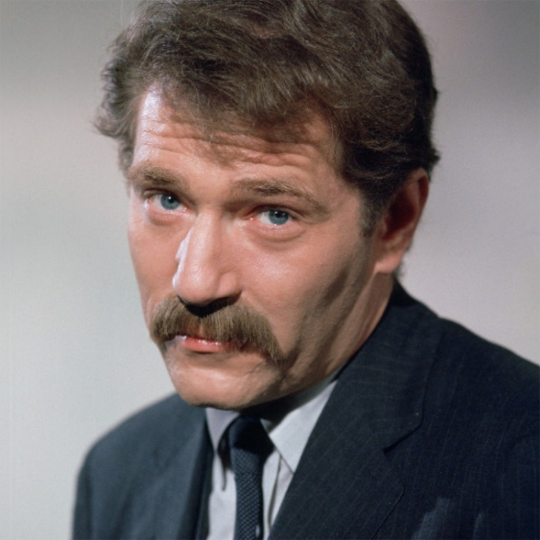
The depth and breadth of Segal’s talent—both comedic and dramatic—can be seen in Bryan Forbes’ searing 1965 World War II drama, KING RAT. Segal plays one of the 10,000 American, Australian and British prisoners at a Japanese POW II. But Segal’s Captain King is a ruthless hustler who runs the black-market operation in the camp. Segal’s skill is also present in Robert Altman’s underrated CALIFORIA SPLIT (‘74), a comedy with dramatic overtones with Segal and Elliott Gould as gamblers who bond over the gambling tables.
Segal is in full flower as a romantic leading man in Paul Mazursky’s comedy BLUME IN LOVE. He plays a divorce attorney who falls in love with the beautiful Nina (Susan Anspach), marries her, cheats on her then tries to win her back after they divorce. The film also stars Marsha Mason in her film debut and a delightful Kris Kristofferson.
At the time of my interview, Segal and the late Mazursky were still the best of friends and met for breakfast several times a month. “I just saw him this morning,” he noted. “I meet these geezers at the Farmer’s Market. We usually talk about showbusiness, the old days and what’s happening now.”
Segal didn’t turn his back on dramas in the 1970s, as witnessed with Irvin Kershner’s superb 1970 dramedy LOVING, in which he plays a commercial artist living in the suburbs with his wife (Eva Marie Saint) and their kids while not dealing very well with a mid-life crisis.
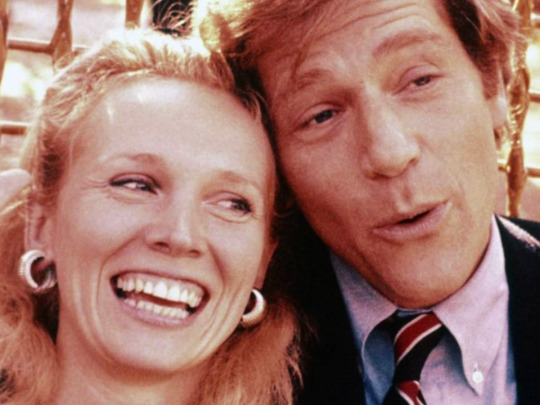
Segal also starred in Sidney Lumet’s 1968 dramedy BYE BYE BRAVERMAN, a box-office flop the filmmaker didn’t like: “It should have been a soufflé, but it turned out a pancake.” The film about four Jewish intellectuals—Segal, Jack Warden, Sorrell Booke and Joseph Wiseman—that travel to a friend’s funeral in a cramped Volkswagen Beetle, may not have excited the critics either, but it’s a wonderful opportunity to catch an early comedic turn by Segal as a public relations writer. Time singled out Segal: “As the story’s central character, actor Segal shows flashes of a comic talent hitherto unexplored by Hollywood.”
By the end of the 1970s and early 80s, Segal’s career slowed because his films weren’t burning up the box office. “Most of us get about 10 years at best [at the top],” Segal confessed. “As you get into playing father roles, the parts dry up because, I don’t mean to say it’s a sex thing, but you have that testosterone vitality. But there are certain actors, like Jack Nicholson, who crested and just kept going. I am in another group, whatever that group is, but I have been tremendously lucky. You just have to keep bellying up to the table.”
89 notes
·
View notes
Text
Salomania: paradigmatic archetype shift
The narrative of Salome is widely known today: the princess of Judea dances to please her stepfather and asks in return for the head of John the Baptist served on a [silver] platter. But the understanding of underlying implications by modern audiences do not correspond to the initial story.

Henri Regnault ‘Salome’, oil on canvas, 1870
In the Bible, the dancing daughter is a twelve-year-old girl without a name. Not only that, but she is not even the hero (or rather the antihero) of the story; her mother, Herodias is.
Obviously, the character did a 180 throughout the years. Salome acquired her name, her sexual awakening, and even half a dozen years to fit the ideological framework of ever changing Christian mythology. A fascinating change.
After the year-long persistence of my friend, I finally got to reading Wilde’s ‘Salome’ followed by our discussion of the play. What piqued my interest was the difference of how each of us perceived the title character: I saw her as a conscientious seductress but my friend argued she was an innocent 14-year-old caught in the web of her desires. It turned out, neither of us was wrong.
Salome’s character is terrifyingly charming, ambiguous and open to interpretations. Wilde wrote her within the dual framework of a virgin whore (a patriarchal dream). In the play, she is on many occasions compared to the moon, the duplicitous symbol on its own. It’s beautifully chaste and divinely pure - thus the connection to virgin goddess:
[Salome] The moon is cold and chaste. I am sure she is a virgin, she has a virgin's beauty. Yes, she is a virgin. She has never defiled herself. She has never abandoned herself to men, like the other goddesses.
Oscar Wilde ‘Salome’
But it is also deceptive and threatening, undoubtedly pointing at its explicit sexuality:
[Herod] The moon has a strange look to-night. Has she not a strange look? She is like a mad woman, a mad woman who is seeking everywhere for lovers. She is naked too. She is quite naked. The clouds are seeking to clothe her nakedness, but she will not let them. She shows herself naked in the sky.
Oscar Wilde ‘Salome’
The moon symbolism is pervasive in the story, appearing in three states and three colors, white, red and black. Each of these leads to the interpretations of Salome as a goddess manifestation:
virgin: Artemis or Cybele who refused to lose their virginity - chaste and pure (white) moon;
whore: Aphrodite/Astarte/Ishtar in charge of love and sex - passionate and seductive (red) moon;
death: mysterious and scary Hecate - malignant dark moon (covered by clouds).
Though this is not a popular interpretation, I still like how flowing it is, especially given that each of the goddesses named has her own relation to the moon.
There’s a curious detail that empowers such a viewpoint. Salome’s dance as devised by Wilde is obviously a striptease - the seven veils that are dropped one by one. He probably developed this idea from one of the contemporary poets:
She freed and floated on the air her arms Above dim veils that hid her bosom’s charms... The veils fell round her like thin coiling mists Shot through by topaz suns and amethysts.
Arthur O’Shaughnessy ‘The Daughter of Herodias’
Striptease, however, was not a new concept (although I like toying with the idea Wilde, the flaming homosexual came up with the ultimate entertainment of a heterosexual man). The goddess Ishtar is known to have dropped her robes and jewels one by one seven times before every gate of the underworld when she was searching for her husband Tammuz. Seems like Wilde went heavy on symbolism here.
Furthermore, there’s a comparison between Herodias and Cybele that (given the similarities between Salome and her mother I’ll be addressing later) finely plays into the whole goddess thing:
Herodias appeared, her coiffure crowned with an Assyrian mitre, which was held in place by a band passing under the chin. Her dark hair fell in ringlets over a scarlet peplum with slashed sleeves. On either side of the door through which one stepped into the gallery, stood a huge stone monster, like those of Atrides; and as Herodias appeared between them, she looked like Cybele supported by her lions. In her hands she carried a patera, a shallow vessel of silver used by the Romans in pouring libations.
Gustave Flaubert ‘Herodias’
Foreshadowing in this short story is nothing but gorgeous.
Biblical story
At the beginning, there was a word. Not a single word - but the mention of Salome in the Hebrew Bible is still scarce:
On Herod’s birthday the daughter of Herodias danced for the guests and pleased Herod so much that he promised with an oath to give her whatever she asked. Prompted by her mother, she said, “Give me here on a platter the head of John the Baptist.” The king was distressed, but because of his oaths and his dinner guests, he ordered that her request be granted and had John beheaded in the prison. His head was brought in on a platter and given to the girl, who carried it to her mother.
Matthew 14:6-11
The general outline of the story is the same: the girl dances before Herod and asks for John’s head on a platter. But the focus is completely different, the main player here is Herodias. The girl doesn’t yet have a name - that will be a later development, when, in one of the texts not talking about John the Baptist’s demise, the name of Herodias’s daughter is identified as Salome.
Mark gives a similar account with much the same details:
And when Herodias’ daughter herself came in and danced, and pleased Herod and those who sat with him, the king said to the girl, ‘Ask me whatever you want, and I will give it to you.’ And he swore to her, ‘Whatever you ask of me, I will give you, up to half my kingdom!’ Then she went out and said to her mother, ‘What should I ask for?’ And Herodias answered, ‘The head of John the Baptist.’
Mark 6:22-24
Nothing in these accounts indicates the sexual dimension of the girl’s character. That changes in the Middle Ages.
Medieval interpretations
Disclaimer: this is where I enter the realm of guesses and speculations. Counter-arguments accepted.
As the Roman Empire fell and before the Renaissance struck, Christianity had its rule indisputable and undeniable. Establishing power over the populace through social events such as Crusades and subjugation of various functional institutions, the young religion rapidly developed its mythology. As part of its strategy of executing control, different groups of population were oppressed (everyone who was not a white male, basically), women among of them.
This is what I assume might have happened to Salome’s narrative: at some point, dance became associated with pagan cults and, as such, not exactly prohibited but condemned and looked down upon along the lines of ‘legs are given to us by God to walk the path of piety not to dance’. As a result, Salome’s dance suffered a blow that changed the character substantially. Here is the sophist argumentation behind the shift:
It is hard to imagine that Herod was so impressed by her footwork or enamored of her execution of dance moves. This dance had as its object the same as most dances - the arousal of sexual desires.
Jacob Hudgins ‘Expository Files 15:5’
The bias behind the argument is immensely, deliciously enjoyable. Besides, it flows quite naturally into the modernist and decadent interpretations of Salome’s story.
There is also a feminist spectrum for this narrative shift. I’m not particularly fond of it as it is tainted with the radical context. Still, it is a viable argument:
Let us be careful of the influence women can have over men.
Jacob Hudgins ‘Expository Files 15:5’
The author also hilariously binds the story of Samson into this. After Delilah tricked him twice already, Samson still trusted her with the secret of another of his weaknesses because of the ‘foolish reasoning of the man focused on fulfilling sexual desires rather than thinking straight’.
In order to exert control over women, they were reduced to two archetypes: a chaste maiden (embodied by none else but Virgin Mary) and a whore (naturally empowered by God’s antagonist and manifested through various characters, especially Jezebel).
As Salome’s dance ended with John the Baptist’s beheading, she could not be viewed as a virtuous character. Instead, she was merged with the vicious attributes of her mother, Herodias, the true villain of the story. This added the sexualized aspect to her dance, whether Salome seduced her stepfather at the direction of Herodias (earlier explanations) or on her own accord (later interpretations).
In favor of this argument is the fact that both Herodias and Salome at some point were associated with Jezebel:
‘Ah! Is it thou, Jezebel? Thou hast captured thy lord’s heart with the tinkling of thy feet.’
Gustave Flaubert ‘Herodias’
Jezebel is the figure of the Hebrew Bible so vile and despised that she became the powerful archetype in itself and later migrated to the New World as part of the ideological framework of slavery. She was associated with false prophets and, through her use of cosmetics, with ‘painted women’ (aka prostitutes). Notably, according to Flaubert, Herod (prior to being introduced to Salome) was seduced by Herodias in a similar manner - an argument in favor of the merging of the two characters.
So, at this point, Salome already possesses her name and the sexual aspect that was nowhere to be seen in the earliest accounts. Modernist view further enriches her character and adds the aspect of control that Salome lacked.
Decadence and character development
In XIX century, Salome crosses another threshold and that’s when the fun begins.
At first, she is still the instrument of her mother. In Flaubert’s short story, Salome is nurtured with quite the demonic intention of seducing Herod:
The dancer was Salome, the daughter of Herodias, who for many months her mother had caused to be instructed in dancing, and other arts of pleasing, with the sole idea of bringing her to Machaerus and presenting her to the tetrarch, so that he should fall in love with her fresh young beauty and feminine wiles. The plan had proved successful, it seemed; he was evidently fascinated, and Herodias felt that at last she was sure of retaining her power over him!
Gustave Flaubert ‘Herodias’
Salome obviously dances an overtly sexual dance, and she knows what she’s doing as the desire of the spectators does not escape her; on the contrary, she enjoys it:
Her round white arms seemed ever beckoning and striving to entice to her side some youth who was fleeing from her allurements. She appeared to pursue him, with movements light as a butterfly.
[...]
Her arms, her feet, her clothing even, seemed to emit streams of magnetism, that set the spectators’ blood on fire.
Gustave Flaubert ‘Herodias’
She is also trusted with carrying out the instructions given to her prior. It seems like Salome knows what Herodias wants from her and has no problem delivering it - however, it still is not her own intention:
[...] she leaned over, smiled upon the tetrarch, and, with an air of almost childlike naivete, pronounced these words:
“I ask my lord to give me, placed upon a charger, the head of—” She hesitated, as if not certain of the name; then said: “The head of Iaokanann!”
Gustave Flaubert ‘Herodias’
With this, the next step is obvious. Transforming from an innocent, even victimized pre-teen girl into an experienced seductress, the possibility of conscious effort has the ability to introduce Salome as the new villain of the story.

Gustave Moreau ‘Salome and the Apparition of the Baptist's Head’, watercolor, 1876
No longer was she merely the dancing-girl who extorts a cry of lust and concupiscence from an old man by the lascivious contortions of her body; who breaks the will, masters the mind of a King by the spectacle of her quivering bosoms, heaving belly and tossing thighs; she was now revealed in a sense as the symbolic incarnation of world-old Vice, the goddess of immortal Hysteria, the Curse of Beauty supreme above all other beauties by the cataleptic spasm that stirs her flesh and steels her muscles, – a monstrous Beast of the Apocalypse, indifferent, irresponsible, insensible, poisoning.
Joris-Karl Huysmans ‘À rebours’
This was the citation that got me digging deeper into the whole Salome story.
Driven by the hype around the subject inspired by the artistic tradition from Renaissance to Enlightenment, Oscar Wilde takes his turn in elaborating Salome’s character, taking the narrative even further. He gifts Salome with depth by applying decadent makeup to her character. Previously being merely a pawn to Herodias, ordered or manipulated into seducing Herod and demanding the prophet’s head, Salome obtains her own voice. Through giving her power of manipulation, Wilde sculpts her into a contemporary icon of femme fatale.
Wilde turns [Salome's] beauty from an object of inspiration to an object of horror.
Carmen Trammell Skaggs ‘Modernity’s Revision of the Dancing Daughter: The Salome Narrative of Wilde and Strauss’
Still, it is arguably relevant to regard his Salome as a spoiled child, a princess who knows no boundaries to her desires and cares little for the price of human life (hence her negligence toward Narraboth, the Young Syrian who kills himself before her eyes, devastated by her interest in Jokanaan and ignoring his advances).
Despite this naivety that stems from Salome’s youth and royal status, she is a figure of impending doom, in accordance to the ambiguity of the moon as her primary symbol in the play. After fascinating Herod with her beauty and seducing him into getting what she desired - Jokanaan’s head and getting a forbidden kiss from it, she scares the tetrarch to the point where he orders to ‘kill that woman’.
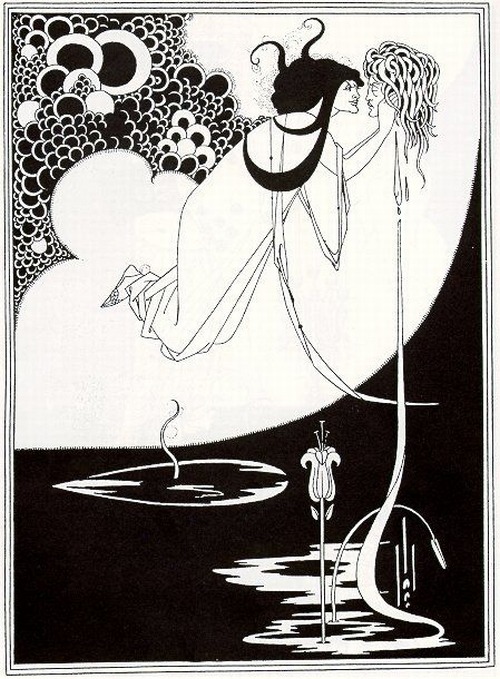
Aubrey Beardsley ‘The Climax’, pen and ink drawing, 1893
The motive of Salome’s gruesome death is not unique to Wilde. Cavafy takes a different approach to the character’s development, even though he still focuses the narrative around her unrequited love:
Upon a golden charger Salome bears �� the head of John the Baptist to the young Greek sophist who recoils from her love, indifferent
The young man quips, “Salome, your own head is what I wanted them to bring me.” This is what he says, jokingly. And her slave came running on the morrow
holding aloft the head of the Beloved, its tresses blond, upon a golden plate. But all his eagerness of yesterday the sophist had forgotten as he studied.
He sees the dripping blood and is disgusted. He orders this bloodied thing to be taken from him, and he continues his reading of the dialogues of Plato.
Constantine Cavafy ‘Salome’
This poem lends yet another dimension to Salome’s character, paralleling the insanity that Wilde’s play establishes. For decadent Salome, her own death is nothing if it serves the purpose of fulfilling her desire.
Notably, Wilde adds another magnificent detail that further enhances the narrative and serves as the marker that, starting from his play, modern audiences viewed this Biblical story through the lens of his ingenuity: the Dance of the Seven Veils. This little particularity that is not commented on in the play whatsoever is arguably the most recognizable element of the narrative today (Richard Strauss’s opera of the same name, strongly inspired by Wilde’s play, is famous specifically for this dance). Even the truncated prophet and his head on a silver platter is not as unique - Titian’s ‘Salome’, for example, is still sometimes viewed as Judith with the head of Holofernes.
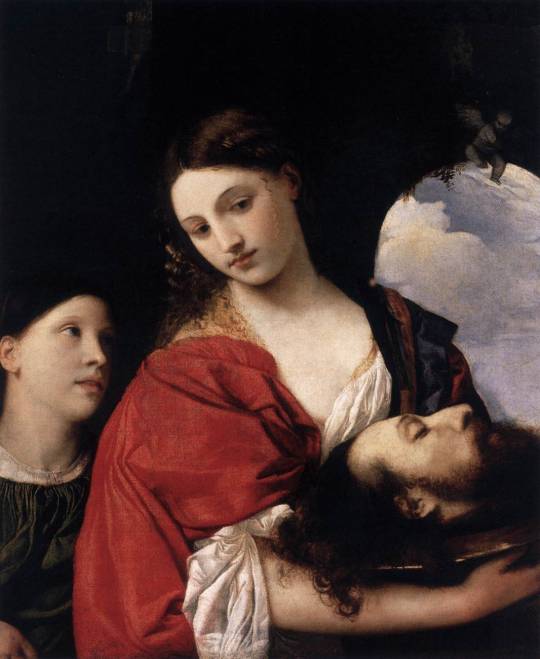
Tiziano Vecellio ‘Salome’, oil on canvas, circa 1515
Modern interpretations
Salome is still as popular today as ever. Naturally, the story migrated to the screens, and there are a few notable screen versions (one of them being 2013 staging by Al Pacino; Jessica Chastain is absolutely terrifying as Salome, it’s really worth watching).
But the one that is actually really different and displays the character in response to the time context is 1953 film with Rita Hayworth.
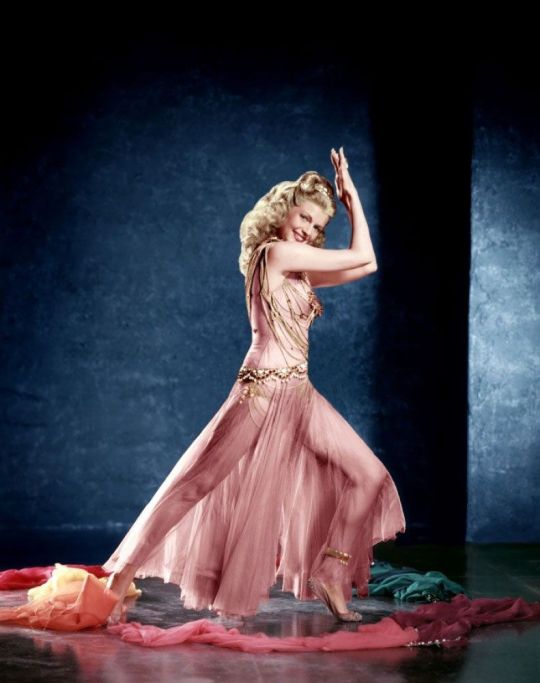
Rita Hayworth as a title character in ‘Salome’, 1953
The film is truly ridiculous. Hayworth’s Salome is virtuous ad nauseam, the embodiment of the contemporary female ideal. She is beautiful - all men have their heads turned as soon as she enters the room. She is strong-willed when she tries to seduce the tetrarch to save Jokanaan. She defies her mother, refuses to obey Herod and actually turns to Christianity by the end of the movie. This is the most Out Of Character Salome to imagine: she is neither the little girl, an instrument of her mother’s political game, nor is she the experienced seductress pursuing her voluptuous desires. (By comparison, in 1961 production ‘King of Kings’, Salome - amusingly portrayed by 17-year-old Brigid Bazlen - is completely villainous with not a word trying to redeem her.) But, undoubtedly, she is the product of her time, which probably demonstrates the major feature of this and any other popular character: adaptability.
This film also starts the tendency of establishing political relevance of Salome. Herodias pursues John the Baptist because he defiles her - but her reasoning is to secure the throne to Salome. Similarly, in most recent interpretations of Wilde’s play, political commentary is not uncommon. According to these, Salome seduces Herod not only to get the head of Jokanaan, but also to get closer to the throne. To reinforce the idea, the focus of Salome while she dances seems to shift from pleasing Herod and his guests to the tetrarch alone - an intimate and subtly calculated move of a fine manipulator. To be honest, I personally still enjoy the dimension of Salome deep in the pit of her insanity more.
Modern poetry also has its take on the story. The focus is more or less dependent on a feminist point of view, with a touch of women empowerment achieved through exacting revenge on men who abused them:
Women are told to keep their legs shut. Women are told to keep their mouths shut. Some women are kept silent for so long, They become experts in the silent theft of power. The fifth veil has dropped.
Clementine von Radics ‘Salome Redux’
And talking about interpretations and weird turns they take. Skaggs discusses in her essay the possible homosexual subtext of Wilde's play. She specifically points to one instance in the play when Salome promises Narraboth a flower, a signal of homosexuality in Wilde’s time. Skaggs and other critics argue that Salome’s sexuality is presented as typically masculine, which makes the relationship between her and the Young Syrian border on homoerotic.
It's a big thing in representing Salome up to the point of the part being played by a male actor in recent stagings. Case and point: ‘Salomé’ by Royal Shakespeare Company. And then there’s Ken Russell’s 1988 film ‘Salome’s Last Dance’. The dance itself is not dropping 7 veils precisely, but is surely is unveiling - with a surprising twist. My jaw certainly dropped. Although I think this interpretation is going a bit overboard, Wilde would have ironically appreciated the critical effort.
Conclusion
Salome’s narrative is nearly paradigmatic as it is exemplary of adaptability of many stories and characters that suffered similar changes through the ages (think Arthur, Robin Hood, and don’t even get me started on ‘The Iliad’). It is not a bad thing (oh no, just look at the beauty of Wilde’s ‘Salome’, which would not be possible without the initial shift). But it does show how myths intertwine with human psyche, how we use them to intensify the ideas and deliver them to our audiences, and how these myths reflect the contemporary questions people ask and values we seek. It’s an infinitely glorious thing, and I am deeply fascinated by it.
Bonus
Salome today is an undeniably tragic character. But there’s also this.
#salome#lots of sources#research#wilde#flaubert#herodias#wilde has his own salome#with blackjack and hookers#everyone wants salome#chance to strip on stage#homoeroticism aplenty#how they made a 12-year old girl into an evil seductress#christianity is all about original sin
7 notes
·
View notes
Text
I was tagged by the lovely @bathshebaeverdenes to answer the following questions. Thank you:
1. You have unlimited budget, free creative rein and choice of actors. Describe the TV show you decide to make.
It may be considered cheating by some, but if I had all the listed above, I’d want to turn two of my MFMM fics into two actual mini-series set in the MFMM universe (I say this instead of ‘episode’ because we’re talking about long fics and I think an episode alone wouldn’t be enough to cover it properly): «Undercover at The Elvsworth Club» and «How Beautiful and Free».
2. Cast it.

Undercover at The Elvsworth Club
- Wendell Yates (Christopher Stanley)
- Olympia Yates (Cate Blanchett)
- Clara Clayton (Jenna Coleman)
- Samuel Bailey (Nicholas Hoult)
- Andrew Taylor (Tom Hiddleston)
- Commissioner William Harker (Liam Neeson)
(Possible accent difficulties would not exist in this ideal world, but my unfortunate lack of knowledge about many Australian actors does)

How Beautiful and Free - The Houseguests:
- Una Montgomery (Julianne Moore)
- William Montgomery (Kyle Chandler)
- Elliott Murrow (Clive Owen)
- Nola Murrow (Lauren Graham)
- Joséphine D’Aramitz (Léa Seydoux)
- Alphonse Pernot (Cillian Murphy)
- Philip Van Asten (Lee Pace)
- Caroline Van Asten (Brie Larson)

HBAF - The Staff:
- Mathilde Brunet (Alexandra Gentil)
- Alain Duval (Jacques Spiesser)
- Rose Leblanc (Brigitte Fossey)

HBAF - A special cameo
- Amadèu Noguès (Oscar Isaac)

HBAF - The Gendarmes
- Capitaine Jacques Rousseau (Lambert Wilson)
- Maréchal des Logis-Chef Aristide Gaillard (Nicolas Duvauchelle)
- Gendarme Henri Lapin (Arthur Dupont)
It’s obvious I haven’t given much thought to any of this.
3. What is the best place to get correct and not fake news that isn’t overly biased to left or right?
I’d probably say the usual ‘suspects’ like the BBC and The New York Times, for instance.
4. Lost piece of literature that you most wish you could read.
Jane Austen’s manuscripts.
5. Introduce me to a favourite painting and say why you like it.
I’d say Mark Rothko’s ‘multiform’ work. They may come across as a bit repetitive, but personally I like their starkness and the more or less pronounced contrast (depending on the colours used). When I got into the Rothko room at Tate Modern I nearly lost it.
6. You’ve got £2000/$3000 and a week off work. Where do you go?
A tour of Britain, a tour of France or Vienna, from the top of my head.
7. Recommend me some music that isn’t created by Anglophone speakers.
You’re probably familiar with his work, but the first name that came into my mind when I read your question was Jacques Brel. I love the lyrics. ‘Ne Me Quitte Pas’ brings me close to tears every time I hear it.
8. Recommend me a non-Anglophone TV show. (And tell me where to watch it!)
I haven’t finished watching it yet, so who knows if it turns into a pile of rubbish in the remaining episodes, but so far I’ think you might like «Las Chicas del Cable», a Spanish Netflix show set in 1928 and which tells the story of 4 women who work at the telephone company, their lives and also their struggles as women in the workplace (and just in the world).
9. Write me a headcanon about a fictional character you know I know.
I think I may have mentioned it once, but in light of your «University Challenge» fic, for some reason, I once thought that Modern-AU Mary would play tennis and be very competitive.
10. Share a life hack.
I can’t think of anything, I’m afraid. :/
11. Is buying a property with leasehold really such a disastrous idea?
I’m afraid I can’t help you put your mind at ease regarding that because I have no idea. I don’t even eat avocado toasts and yet I don’t think I’ll get a house in the forseable future, so I haven’t looked into it and be able to give you any piece of advice. I wish you all the best nevertheless.
So now I’m supposed to write 11 new questions and tag 11 people:
1. What's the book in your ‘to read’ pile that you are looking forward to the most?
2. What’s your first TV-related memory?
3. Do you have a favourite ‘fashion era’? If so, which one it is and why does it appeal to you?
4.What’s the last song you listened to?
5. What’s your favourite boardgame?
6.If you could live in any ‘iconic’ house (of TV or film fame, historical value, architecture history, etc) , which one would you choose?
7.What’s your ‘comfort food’?
8. Is there a sport you’d like to try someday? Why?
9.Do you speak other languages?
10. Do you have a favourite poem?
11. Do you find coming up with this kind of questions tremendously hard?
Tagging (but it’s totally okay if you don’t want to do this): @foxspirit1928, @whopooh, @suallenparker, @olyphantss, @otherpens , @loveforallthingsclassic , @krista-cyr , @firesign23 , @slimwhistler , @bewltched, @thymelady
#bathshebaeverdenes#answer#Rick: Louie I think this is the beginning of a beautiful friendship.#personal
4 notes
·
View notes
Text
Month in Review // Christmas is Over Thank Fuck – December
Christmas is officially done and dusted and honestly, I am so fucking thankful.
I loved Christmas day but the days leading up to Christmas? I’m good thanks, can I get Christmas without them next year?
Between the chaos that is Christmas and the extra shifts at work (plus a month-long convoluted promotion) and no longer having a best friend, because of course, I am ready to disappear for at least a year.
Sadly I can’t do that so here we are to discuss my month!

December






Month’s TBR
I didn’t set one!





Read
│Lady Mary│Lucy Worsley │

│


│★★★│Read Dec 18│

│ This was fine??? A little boring, but I actually didn’t mind the MC and was surprised that I got through it? Maybe only having to read it in 30 minutes spurts while I was exercising did this book, and me, a favour.
│The Monsters We Deserve│Marcus Sedgewick │

│


│★★★│Read Dec 27│ This was confusing but I liked it??? Convinced me to read Frankenstein though!
Book of the Month
│To All the Boys I’ve Loved Before│To All the Boys I’ve Loved Before│Jenny Han│




│

│★★★★│Read Dec 26│


│ This was so stinking cute! I think I might like the film a little better but this was still a very good read and I look forward to the rest of the books in the series!
Look at all those books.

Listen, December was tough, take pity on me, please.
│December│ARC: 2│Owned: 1│Library Loans: 0│Reread: 0│Diversity: 2/3│Average Rating: 3.5★’s│





Haul
I was too busy to buy books!







Film & TV
Month’s TBW
│Charmed│Season 1│

│
│Drag Race All Stars│Season 4│

│
│Boy Erased│

│
│Robin Hood│

│
│Widows│

│
│The Grinch│

│
│Wreck-It Ralph│

│
│Ralph Breaks the Internet│

│
│Elf│

│
│How The Grinch Stole Christmas│

│
│Ratatouille│

│
│Buzzfeed Unsolved│

│
I actually got through Charmed very quickly and I have no idea how???
All Stars 4 has only just started but I’m already up to date!
I kind of watched Wreck-It Ralph and by kind of I put it on and sort of paid attention. Oops.
I was planning on seeing Ralph breaks the internet with my nephews but they want to see Bumblebee instead so I guess I’ll watch it next month!
I didn’t watch Ratatouille because I didn’t end up having a movie day with my (now ex?) best friend.
And I don’t think I’ve watched any Buzzfeed Unsolved but I don’t think there has been any new episodes?





Watched
│Charmed│Season 1│

│1998│

Constance M. Burge│

Holly Marie Combs, Alyssa Milano, Brian Krause│★★★★│ Fave Sister: Isn’t everyone’s Phoebe?? So much nostalgia attached to this series! I loved it!
│Drag Race All Stars│Season 4│

│2012│

RuPaul│

RuPaul, Michelle Visage│★★★★│ Fave One-liner This Season: “Yeah, well some of us don’t have to force story-lines to get air time” -Farrah Moan. I am living.
│Boy Erased│

│2018│

Joel Edgerton│

Lucas Hedges, Nicole Kidman, Joel Edgerton│★★★★│ Fave Character: Gary & Cameron This was soooo good and I cried.
│Robin Hood│

│2018│

Otto Bathurst│

Taron Egerton, Jamie Foxx, Ben Mendelsohn │★★★★│ Fave Part: I loved all of it! I kind of wasn’t expecting what I got from this?? But I loved it. Big on revolution and I was all for it.
│Widows│

│2018│

Steve McQueen│

Viola Davis, Michelle Rodriguez, Elizabeth Debicki│★★│ Fave Character: Veronica: [to her gang] Now the best thing we have going for us, is being who we are. Alice: Why ? Veronica: Because no-one thinks we have the balls to pull this off. I hated it. That’s harsh, I didn’t hate it. I was just confused literally the whole time.
│The Grinch│

│2018│

Yarrow Cheney, Scott Mosier│

Benedict Cumberbatch, Cameron Seely, Rashida Jones│★★★★│ Fave Character: Cindy-Lou I went and saw this with my sister and it was good, not How The Grinch Stole Christmas good but still alright.
│Wreck-It Ralph│

│2012│

Rich Moore│

John C. Reilly, Jack McBrayer, Jane Lynch│★★★│ Fave Character: Vanellope I put this on for me and mum to watch and neither of us paid any attention. Sometimes we’re just not in the right head space for a movie.
│Elf│

│2003│

Jon Favreau│

Will Ferrell, James Caan, Bob Newhart│★★★★│ Fave Scene: When Buddy eats the cotton balls. I watched this with my sister for the first time and I really enjoyed it!
│How The Grinch Stole Christmas│

│2000│

Ron Howard│

Jim Carrey, Taylor Momsen, Kelley│★★★★★│ Fave Part: All of it. The ultimate Christmas movie, fight me about it. I watch it every year and this year I watched it with my sister!
│Hannibal│Season 1│

│2013│

Bryan Fuller│

Hugh Dancy, Mads Mikkelsen, Caroline Dhavernas│★★★★│ Fave Part: That everyone is unknowingly eating human meat. I’m really enjoying this so far!
│The Holiday│

│2006│

Nancy Meyers│

Kate Winslet, Cameron Diaz, Jude Law │★★★★│ Fave Line: “You’re supposed to be the leading lady in your own life, for God’s sake!” I forgot how much I like this movie!
│Bumblebee│

│2008│

Travis Knight│

Hailee Steinfeld, Jorge Lendeborg Jr., John Cena │?│ I’m also seeing Bumblebee tomorrow but this is going up early so I’ve got no star rating yet.





Youtube
│Meghan Rienks│

│★★★★★│ Fave Video: YULE LOG ∙| baking with meghan |∙ BAKEMAS DAY 1 I stan one (1) ADHD baking blonde.
│Lily Marston│

│★★★★★│ Fave Video: Dressing Up As Each Other ft. KELSEY DARRAGH Since the whole Defy Media debacle, I’ve been watching a lot of the old hosts’ videos to support them! I’ve always really loved Lily and her laid-back attitude and disaster vibes.





Music
│Camila Cabello│She Loves Control│Consequences│Into It│Something’s Gotta Give│Inside Out│In the Dark│
│Madison Beer│Say It To My Face│Dead│HeartLess│Hurts Like Hell (Feat. Offset)│
│Halsey│Without Me│
│Little Mix│Joan of Arc│Monster in Me│
│The Greatest Showman Reimagined│Never Enough (Kelly Clarkson)│This Is Me (Kesha)│Rewrite the Stars (James Arthur & Anne-Marie)│





Podcasts
│My Favorite Murder│

Karen Kilgariff, Georgia Hardstark│★★★★★│ Fave Quotes: “The devil made me do bad math”, “All I wanna talk about at parties is horrible, terrible things”, “He’s polite, he’s charming, and he’s calm, just like any good psychopath would be”, “It’s always raining inside of me” Fave Episode: Of recent, 145 – Live at the Mircosoft Theater in Los Angeles. They did a show for 7000 people for Halloween! Uhhhh Guys they had Cameron Britton AKA Mindhunter’s Ed Kemper on to tell his Hometown on the Halloween Live Show!!!!!
│Unsung Sluts│

Stacie Rasmussen, Tabitha Davis│★★★★★│ Fave Quote: “If you can’t beat them, lead them.” Fave Episode: Episode 12 – Witches and Banshees
│History is Gay│

Gretchen Ellis, Leigh Pfeffer│★★★★★│ Fave episode: Episode 8: Nazi Punks F**k Off, Pt 1: Magnus Hirschfeld & Episode 17: He’s a Real Wilde One (Oscar Wilde)
│Do You Need a Ride│

Karen Kilgariss, Chris Fairbanks│★★★★☆│ This is a new one I’ve just started listening to and so far so good!
│88 Cups of Tea│

Yin Chang│★★★★☆│ Fave part: Learning that Victoria Schwab is a top shelf gay. Fave Episode: V.E. SCHWAB: Bonus Full Episode Guys that episode is over three hours long! This podcast is for every author ever, aspiring or otherwise!







Use Your Words Highlights
Book Review // Girl Made of Stars – I Am Broken
Bookish Bits // Library Love – 2018
Grey Watches // Give Jim Cary or Nothing – How The Grinch Stole Christmas
Grey Watches // I Love Stupid Funny – Elf
Grey Watches // I Hate It So Much I Love It – A Christmas Prince
Grey Watches // It Has To Be A Shit Show – A Christmas Prince: The Royal Wedding
Grey Watches // I Wanna Bone Jude Law and Kate Winslet – The Holiday





Blogosphere Highlights
│Destiny @ Howling Libraries│ANNOUNCEMENT: LATE-A-THON!│
│Krystin @ Here’s The Fucking Twist│Booknerd Wednesday: My Holiday Wishlist!│
│Elise @ The Bookish Actress│THE LEGACIES WE CHOOSE TO LEAVE│
│Jamieson @ Jamishelves│T5W: BOOKS TO GIVE TO SAGITTARIUS PEOPLE│
│Aurora @ Aurora Librialis│The Most Beautiful Books of 2018 │
│Swetlana @ The Caffeinated Bookworm Life│Bloggers Recommend Their Favorite Books Part 1 // Blogmas Day 8│Bloggers Recommend Their Favorite Books Part 2 // Blogmas Day 17│Reacting To Popular Books You Guys Won’t Read // Blogmas Day 19│
│Marija @ Inside My Library Mind│The Ultimate Character Reading List feat. Blogging Friends│Character Reading Lists│Arya Stark’s Reading List│Hermione Granger’s Reading List│Nina Zenik’s Reading List│Ronan Lynch’s Reading List│
│Vicky @ Vicky Who Reads│The Double Standard Applied to POC in the Book Community│Favorite Feel-Good Reads, Why They’re Important, & Life Updates!│
│May @ Forever and Everly│To All the Books that Emotionally Wrecked Me This Year & Why I Cried Over More Books in 2018 than Ever Before│
│Taryn @ Taryn and Her Books│ON CONSUMERISM IN THE BOOK COMMUNITY & MY 2019 BUYING BAN | DISCUSSION│
│Ashley @ The Infinite Library│Let’s Talk: About Sex, Baby…in YA Fiction (Part 1)│
│Sofia @Bookish Wandress│6 Diverse YA Contemporaries That You Should Read: 2018 Edition│
│Natasha @Sapphic Solace│Discussion: The I realised I Was Queer Because of You Trope, Why I Love It, and Some of My Favourite Examples│
│Lily @ Sprinkle of Dreams│Bookish Musings & Discussion Time // “How Objective are ARC Reviews?” by Vicky Who Reads│


Month’s Goals

Try and post 4 times a week like I have been!


I wanna try audiobooks again???


No Borrowing library books unless they’re holds or audiobooks


Continue going on walks 4-5 times a week. 3 at the very least!


Keep up with Bullet Journal because it actually helps me get shit done and be less of a mess.


Try not to eat loads of takeaway, even though I’m gonna be super busy and tired, unless unavoidable.


Make one of Chrissy Teigen’s recipes because they look Bomb af

I mostly kept up with my blogging schedule!
I didn’t find an audiobook I wanted to read available from my library so I just didn’t listen to any. Plus I’m annoyed at myself because Audible had like a 3 months free trial thing happening and I forgot to sign up until the day after the promotion ended. Also from what I hear the American Audible is better so I don’t know if maybe I should sign up for that one?? I know when I was signed up, I was with the UK one because it was better but I don’t know if they let you do that anymore? If anyone can help me I’d really appreciate it! Also, $17 a month is just a lot of month to me.
I haven’t been to the library unless it was to return books!
I realised that the Bullet Journaling gives me too much power! Here’s the thing, I like things to be customisable because I work out what I want and get angry when I can’t do things that way. Unfortunately, I think Bullet Journals are too customisable for me and isn’t really working?? I don’t know. I’m going to look into other diaries for the new year and see if I can find something that fits me better.
I did eat more takeaway than last month so that’s not great but I also didn’t eat more than I used to so that’s good and what I did eat of it were mostly small things. Still not great though!
I’m trying to make @chrissyteigen’s Chicken Pot Pie recipe and I’ve burnt the crust, it’s taking me ages, my arm is sore, everything is in American measurements, I thought I’d get it done in an hour like an idiot who doesn’t read recipes through properly and I wanna die.
— Greyson (@useyourrwords) December 23, 2018
I Did Things
I went to the movies with my mum twice this month!
I also went to the movies with my sister which was good! Then we came home and watched Christmas movies together and things got a little emotional and there was a little miscommunication but we worked it out and I’m hoping that we spend some more time together in the coming weeks.
My sister and I both don’t really have a whole lot of people we’re close to. We’re introverts but we also craving some socialising to a point so I think it’ll be good to have us spend some time together. It would also be nice to grow closer to her because I know we both are in need of people we can trust and talk to openly.
My mum and I babysat my Nephew this month as well and it was so much fun. He’s such an easy baby! Literally you can sit him on the couch and he’ll bounce himself off the back of the lounge for hours. He put himself to sleep doing it. Twice.
He’s very cute!
Uhhhh I Maybe No Longer Have A Best Friend?
Long story short I told my best friend of over 10 years that I was officially and legally changing my name for Christmas (it was never a secret that I wanted to change it, she’s known for years) and she didn’t react well at all.
I was firm and told her that if she wanted to continue in my life she had to respect me, and that includes respecting my name and be prepared for big changes ahead.
I’ve given her space to process and decide but haven’t heard from her since so I don’t know, it’s a bit up in the air but I’m handling it surprisingly well so maybe it’s a sign that us parting is for the best???
I don’t want to lose her, but I won’t lose myself to keep her. I won’t sacrifice pieces of myself for the sake of others anymore. All that does is validate toxic behaviour and cost me my health and happiness.
She was kind of my only actual real-life friend who I speak with outside of work so uh good thing I’m too busy to feel lonely.
But I’m super grateful for the people I’ve met through the book community, having this blog and talking to you all reminds me that I’m not really alone. I just have to reach out to people which is, um…not easy for me but I’m trying to work on it.

I hope y’all had a great month to end 2018 on!
What did you do this month? What did you read? What did you watch? What posts did you write that you’re super proud of?
│Blog│Goodreads│Instagram│Twitter│Tumblr│

from WordPress http://bit.ly/2Qcs954 via IFTTT
0 notes
Text
WHAT TO WATCH THIS WEEKEND November 16, 2018 - Fantastic Beasts, Widows, Instant Family, Green Book
I didn’t do too bad last week, although other than Universal’s The Grinch, the new wide releases got spanked by either bad reviews, bad marketing or general moviegoer ennui. That should change this weekend with the next movie in one of Warner Bros’ more successful franchises.
But before we get to that big release for the weekend, I want to give a little extra attention to the movie which is currently my #1 movie of the year, and that is Peter Farrelly’s GREEN BOOK (Universal).
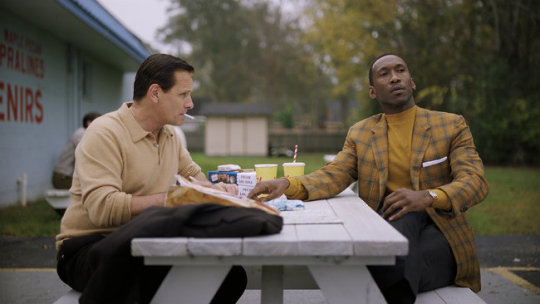
Yes, you read that right, that’s Peter Farrelly of the Farrelly Brothers, famed for their low-brow comedies that began with Kingpin and There’s Something About Mary, and then petered out as the ‘00s turned into the PC word that it is today. Needless to say (but I’m gonna say it anyway), Green Book is a completely different beast – it’s a buddy road comedy set in 1962, as Viggo Mortensen’s Italian bouncer Tony Vallelonga (or “Tonylip”) takes on the role of driver and bodyguard for a black piano prodigy, played by Mahershala Ali, as he tours the racist Deep South.
I had already been hearing raves out of the Toronto International Film Festival (where it won the coveted People’s Choice award), but I wasn’t convinced until I saw the movie myself for the first time. I’m a little hesitant to say too much about the film, because part of the joy is just watching these two fantastic actors commit to each of their equally-compelling characters. Tony is a loud-mouth take-no-crap Bronx native who is just looking for a job to take on while the Copacabana club where he works is renovated. Dr. Don Shirley (Ali) is an educated, eloquent and well-mannered classical musician who can’t be more different from Tony.
As they travel down to the Deep South, Tony starts to see the racism that Shirley has faced his entire life—being invited to play at fancy restaurants and club where he’s not even allowed to use the same facilities as the wealthy and snobbish clientele. What’s amazing about their story (which is based on actual people) is that as you watch them arguing and eventually bonding (as happens in the best of buddy comedies), you find yourself relating to both of them, even if you have no direct connections to either.
Mortensen is such a charming and entertaining character that it’s hard not to love him, but the way that Ali makes you feel for the way his character is a lonely outcast, whether it’s around white or other black people, just makes this film such a unique experience.
I’m honestly shocked by what a great film Farrelly has made here, a joyfully entertaining piece of fictionalized history that does a better job exploring racism and the relationship between races. I thought Spike Lee’s BlacKkKlansman and Barry Jenkins’ if Beale Street Could Talk, but they also were needlessly preachy, whereas films like Green Book and The Hate U Give force you to think about these things without necessarily hitting you over the head. Frankly, I feel that we’ve gone backwards from all of the great inroads made in race relations in the ‘70s, ‘80s and ‘90s, but it’s good to have reminders like this that there was a time when things were much worse.
So far this year, no other movie has had quite the effect on me in terms of entertaining and moving me. Green Book is not only the best movie I’ve seen this year, but also my favorite. Definitely go see this!
Rating: 10 out of 10
I’ll get to the rest of this week’s movies after the jump…
FANTASTIC BEASTS: THE CRIMES OF GRINDELWALD (Warner Bros.)

As mentioned above, the big movie of the weekend is the next movie in the “Wizarding World” franchise that began with the eight movies based on JK Rowling’s popular book about boy wizard Harry Potter (as played by Daniel Radcliffe). This is also the first sequel to Fantastic Beasts and Where to Find Them, which Rowling wrote for the screen based on the Newt Scamander wizard character (played by Eddie Redmayne). The original Fantastic Beasts opened on this same weekend in 2016 to $74.4 million and grossed a more-than-respectable $234 million domestically, plus double that amount overseas, so it made perfect sense for Warner Bros. to want to continue the series, and it’s already been noted that they want to make five movies total.
The Crimes of Grindelwald is a straight-up sequel with Scamander travelling to Paris with his magical colleagues, played by Katherine Waterston, Dan Fogler and Alison Sudol, to fight the evil wizardy of Grindelwald, as played by Johnny Depp. Characters played by Zoe Kravitz and Carmen Ejogo are also featured more fully, but the real draw might be that the movie introduces the younger version of Professor Dumbledore, as portrayed by Jude Law. This is probably Law’s most prominent roles in a while with last year’s King Arthur: Legend of the Sword from Guy Ritchie being a box office dud, and it’s been seven years since Law made the sequel to Sherlock Holmes, also with Ritchie and with Robert Downey Jr.
Reviews for the Fantastic Beasts sequel have been mixed (at best), some of that due to the Johnny Depp factor, because Warner Bros. – who yanked Brett Ratner’s credit off their movies as soon as the #MeToo movement broke out – failed to read the room after the accusations against Depp from his former wife Amber Heard (who stars in the upcoming Warners movie Aquaman.) Even before that ugly affair, Depp’s star had begun to falter, although you probably couldn’t tell by last year’s movies with the fifth Pirates of the Caribbean grossing $172.5 million domestically and another $622 million overseas. Depp also appeared in Murder on the Orient Express, which also did well, maybe because his character was murdered pretty quickly in the film. Depp’s recent film with Heard, the long-delayed London Fields, was a big-time bomb last month, and it doesn’t seem like audiences are as interested in seeing him in movies. (Even Disney has decided to reboot Pirates without Depp.)
Still, there’s that rabid JK Rowling fanbase that has been kept fed with steady visits to the Wizarding World at Universal Studios, not to mention the Cursed Child stageplay which arrived on Broadway earlier in the year. The success of both ventures has shown that the Harry Potter craze has not died down without new books or movies based on them. (It’s also good to note that exactly half the original Harry Potter movies opened this exact weekend in November with openings ranging between $88.4 million and $125 million, and the latter was eight years ago when ticket prices were significantly cheaper.)
What else can I say? Well, there’s the IMAX factor which helps up the average ticket price for those going to see the movie. There’s the usual caveat about their being too many family films already in theaters with another one opening next Wednesday.
Essentially, there are a lot of factors that need to be applied to The Crimes of Grindelwald, but the fanaticism of the Harry Potter fanbase should endure over any negatives, including the reviews. With previews on Tuesday night (which will be rolled into Friday), this should still open slightly bigger than the first movie, maybe closer to $80 million than $70 million. Even so, it’s going to have a tougher road to $200 million with Disney’s Ralph Wrecks the Internet opening next Wednesday. (The original Fantastic Beasts dropped 39% in its second weekend against Disney’s Moana, and that wasn’t a sequel to a $189 million blockbuster hit.)
ED’s Review of Fantastic Beasts: The Crimes of Grindelwald
WIDOWS (20thCentury Fox)

Offering the first bit of counter-programming against the Wizarding World juggernaut is the new movie from British filmmaker Steve McQueen, whose previous film 12 Years a Slavewon Best Picture about five years back. It grossed $56.7 million domestically with a strong expansion plan from Fox Searchlight that more than made back the movie’s $20 million budget, greatly helped by the $131 million overseas.
For his fourth film, an adaptation of Lynda La Plante’s recently-released novel, McQueen went over to the parent Fox, presumably to have an even bigger budget for his first heist film, which is just as star-studded as 12 Years a Slave. He also had help with the adaptation from author Gillian Flynn, whose own bestselling novel Gone Girlwas turned into a hit thriller by no less than David Fincher. The basic premise is that a group of thieves end up being killed in a heist-gone-wrong by the police after stealing $2 million from a local thug who comes to the wife of the gangleader to get the money back… or else!
McQueen’s latest has a lot going for it, not just the fact that it’s a crime action-thriller as opposed to a weepy historical drama about slavery – frankly, I’m surprised 12 Years a Slave did that well, but that’s a testament to the power of Searchlight.
Really, the biggest factor that will help Widows is its cast, which includes a number of Oscar winners, most importantly the amazing Viola Davis, whose amazing supporting role in Denzel Washington’s Fences finally won her that Oscar. That also grossed $57 million after a late December platform release, and if you put that next to the grosses of McQueen’s last film, that’s a pretty good barometer for Widows. (The biggest difference is that this is opening nationwide in 3,000 theaters rather than trying to build word-of-mouth.)
Davis’ husband is played by Liam Neeson, who has done his fair share of action-thrillers, and though he has a smaller role in this, his presence is still felt. After Davis, a lot of people will be talking about the performances by Brian Tyree Henry (star of the hit FX series Atlanta) and Daniel Kaluuya, the Oscar-nominated star of Jordan Peele’s Get Out last year and Marvel’s Black Panther. If Davis isn’t able to get African-American males into theaters, than these two guys should help. There’s also Colin Farrell, the Irish actor who seems to be having a bit of a resurgence in recent years with roles in last year’s The Killing of a Sacred Deer and Roman J. Israel, Esq., neither huge moneymakers but Farrell received many accolades. (And of course, he starred in the original Fantastic Beasts and Where to Find Them
Davis’ partners in crime are played by Michelle Rodriguez from the Fast and Furious movies; Australian actor Elizabeth Debicki, who appeared in films like Guardians of the Galaxy Vol. 2 and others but who really gives a breakout performance here; and the Tony-winning actor Cynthia Erivo, who just blew me away in Bad Times at the El Royale. Then there’s the parental units (of Farrell and Dubecki’s characters respectively) played by Robert Duvall and Jacki Weaver.
Just from that cast alone, it’s obvious why Fox is hoping this will be a good play for Oscar night, especially with the Queen biopic Bohemian Rhapsody receiving mixed reviews and possibly only getting Rami Malek a nomination.
Widows should be a good counter-point to Fantastic Beasts and with few other movies (including Tyler Perry’s Nobody’s Fool) popping with African-American moviegoers, especially not males, I can see Widows bringing out a solid audience of those not interested in other films. I’m not sure it will quite make $20 million this weekend, but it should make a play for third place against Bohemian with $15 to 17 million. Its biggest hurdle is MGM’s sequel Creed II opening on Wednesday which may steal away some of its business, but word-of-mouth could make it a good alternative over Thanksgiving and in the slower weeks to come.

Mini-Review: I’m not sure I’ve ever been as surprised by the evolution of a director as I am with Steve McQueen going from his Oscar-winning work on 12 Years a Slave to Widows. Mind you, I was already a fan of McQueen from his first film Hunger, but I never expected he’d be able to do something like this.
Widows begins with a heist as Liam Neeson’s Harry Rawlings and his colleagues are in a van after a robbery, which cuts back to a quieter time between Harry and his wife Veronica (Viola Davis). It’s a fairly jarring introduction to the characters, especially the way McQueen films the demise of Rawlings and his gang. The Chicago’s 18thward is in the midst of a heated political race between Colin Farrell’s Jack Mulligan, a second-gen politician, and Brian Tyree Henry’s Jamal Manning, who happens to be involved in the city’s crime sector along with his sadistic brother Jatemme (Daniel Kaluuya). Turns out that the money Rawlings stole belonged to the Mannings, and Jamal threatens Veronica that she needs to repay his $2 million in a week or face the consequences. Veronica turns to the wives of the other dead thieves (played by Michelle Rodriguez and Elizabeth Dubecki) to enact a plan for Harry’s next big job, which is to rob Mulligan.
Needless to say, with a cast this good, you’re going to end up with a number of brilliant performances. While Davis is a clear stand-out, Dubecki is also impressive as a woman used to being pampered who has to start earning her own living as an escort. Kaluuya is also quite a scene-stealer as the homicidal Manning enforcer, and I wish there was more of him in the movie. Brian Tiree Henry is equally good, and Colin Farrell continues to impress me, and the fact that Davis can be so memorable against so many other great performances (including her scene-stealing dog) shows her to still be at the top of her game. Robert Duvall and Jacki Weaver are also quite great without even having to try very hard.
On paper, this could have been a standard heist film, but McQueen thrives on the complexities of the story’s intricate plot to keep the viewer invested as we follow a number of stories at the same time. Where McQueen really thrives is at creating tension, from the opening set piece which leads to a slow-building thriller to the point where the actual robbery is just as nail-biting as anything I’ve seen on screen this year.
From the very beginning, McQueen has DP Sean Bobbit shoot the film in such an unconventional way. For example, when Jack Mulligan is having an argument inside his limo with his wife, the camera remains outside the car as it drives, something that gets more uneasy as you realize that the camera is just going to stay there for a very, long time.
If you’re a fan of the heist genre, Widows delivers on everything promised by Ocean’s 8 earlier this year, a strong female-centric crime film that’s up there with what’s been done by men in the genre. In this case, McQueen may have clinched himself a second Oscar nomination with his brilliant work at pulling this amazing cast together into such a compelling story. Rating: 8.5/10
INSTANT FAMILY (Paramount)
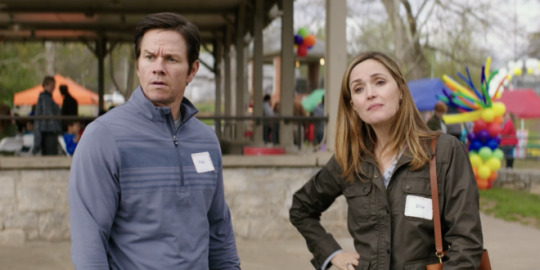
If Green Book wasn’t opening this weekend, I would probably give this new dramedy from Paramount a bit of extra lip-service, because it’s also quite a wonderful movie. Unfortunately, it doesn’t have quite the buzz that the Peter Farrelly period comedy does (for reasons mentioned above).
This is the new movie co-written and directed by Daddy’s Home director Sean Anders, and it once again teams him with Mark Wahlberg, the star of those two comedy hits. The big difference with Instant Family is that it’s based on Anders actual experiences adopting three kids, and it’s not a silly Will Ferrell comedy like the Daddy’s Home movies. That may or may not be a good thing when you realize that the first one of those movies made $150 million while the second made over $100 million, and that was just domestically. The sequel opened a little earlier in November to $29.6 million, and those kinds of returns guaranteed Paramount wanted to stay in bed with Anders, especially with Wahlberg as lead.
Wahlberg has built quite a side career for himself as an actor in comedies with hits like the two Daddy’s Home movies, and at least the first Ted comedy, which had him playing the straight man to a Seth MacFarlane-voiced stuffed bear. The original movie in 2012 did substantially better than its sequel three years later, but Ted 2still made $81 million domestically. Wahlberg’s real break into comedies probably began with his earlier teaming with Will Ferrell for Adam McKay’s The Other Guys, which also broke $100 million domestically.
Playing Wahlberg’s wife is Rose Byrne, the talented actor who broke out with comedies like Paul Feig’s Bridesmaids and Spy, and she recently starred in the Nick Hornby adaptation of Juliet, Naked (which you may recall is another one of my favorite movies of the year). The other part of the equation is popular actor Octavia Spencer, who has received three Oscar nominations, winning for The Help in 2012, a movie that co-starred Widows’ Viola Davis. She teams with popular comic Tig Notaro as adoption agency counselors, and the film also stars breakout star Isabela Moner, who co-starred with Wahlberg in the last Transformers movie, also for Paramount. So basically Instant Familyis keeping it all in the family.
I’m probably not going to review Instant Family since it’s been quite a few weeks since I saw it, but it’s a wonderful movie, a real crowd-pleaser – warm, sweet and funny with Rose Byrne being her usual wonderful self. The fact that it’s loosely-based on Anders’ own story makes it even more compelling, and I hope that people seek it out (not hard since it will be in 3,000 theaters across the country). This might be more of a sleeper that does better as people get into the holiday spirit, as it has a little bit of that in the story.
That said, I’m worried this will be hurt more by Fantastic Beasts than vice versa, and that might mean that it will have to rely on word-of-mouth to get it through the rest of the month. If no one goes to see the movie this weekend, then that’s going to be hard. Because of this (and how crowded the marketplace is), I could see this making between $13 and 15 million this weekend but maybe it’ll make its way to $50 or 60 million if it can get past the slew of Thanksgiving releases.
Also expanding nationwide into about 800 theaters is Matthew Heineman’s A Private War, starring Rosamund Pike as war journalist Marie Colvin, which I personally feel deserves at least another Oscar nomination for the Gone Girlstar. We’ll see if it expands wide enough and gets enough attention to get into the top 10, but I think it will end up somewhere in the $1 to $1.5 million range, not enough to get into it. There’s a chance Joel Edgerton’s Boy Erased may expand further this weekend, as well.
This week’s Top 10 should look something like this… UPDATE: Changing some of the numbers below, since actual theater counts have been released and many of the returning films (including A Star is Born) have lost way more theaters than I expected. Basically, theaters are dumping movies to open up screens for this week’s offerings as well as the new Thanksgiving movies on Wednesday. (Also, Widows is opening in fewer theaters than originally estimated.)
1. Fantastic Beasts: The Crimes of Grindelwald (Warner Bros.) - $77.8 million N/A 2. The Grinch (Universal) - $38.4 million -43% 3. Bohemian Rhapsody (20thCentury Fox) - $18 million -45% 4. Widows (20thCentury Fox) – $15.5 million N/A 5. Instant Family (Paramount) - $14.4 million N/A 6. A Star is Born (Warner Bros.) - $5.3 million -35% 7. Overlord (Paramount) - $5.3 million -48% 8. The Nutcracker and the Four Realms (Disney) - $4.7 million -53% 9. The Girl in the Spider’s Web (Sony) - $3.7 million -53% 10. Nobody’s Fool (Paramount) - $2.8 million -58%
LIMITED RELEASES
We’re just one week away from Thanksgiving, which means we’re getting down to the nitty-gritty in terms of the first group of awards and nominations, which will take place in the weeks following Thanksgiving.

Apparently, the Coen Brothers’ Western anthology THE BALLAD OF BUSTER SCRUGGS (Netflix)opened a week earlier than planned in three theaters in New York, L.A. and San Francisco. It would have been nice if someone from Netflix bothered to tell me, so I could have included it in last week’s column. Anyway, it will open in more theaters and be streaming this Friday, so I might as well write more about it, since I never got around to writing about it at the New York Film Festival. The title character is played by Tim Blake Nelson, but don’t get used to him, as he’s only the star of the first segment, which is also the best. The Ballad of Buster Scruggs is very much an anthology film that allows the Coens to explore that genre further than they have in the past with a varied mix of stories of different lengths featuring a cast that includes James Franco, Liam Neeson, Brendan Gleeson, Stephen Root, Tyne Daley and Zoe Kazan. The segment with the latter is the longest, and it takes a while to get going, but I especially liked the segment which starred Tom Waits, mostly by himself as a gold prospector. The movie will be streaming on Netflix on Friday, but I do recommend seeking it out in theaters, and in New York, at least, it will be playing at the IFC Center and the Landmark on 57thStreet.
Another New York Film Festival (and Venice) premiere is Julian Schnabel’s latest film AT ETERNITY’S GATE (CBS Films), which stars Willem Dafoe as painter Vincent Van Gogh and Oscar Isaac as Paul Gauguin, who become friends during Van Gogh’s days in the south of France. Rupert Friend plays Vincent’s brother Theo Van Gogh, and the film also stars Mathieu Amalric (from Schnabel’s earlier film The Diving Bell and the Butterfly), Emmanuelle Seigner and Niels Arestrup. Honestly, I wasn’t a particularly big fan of the film, which involved a lot of noodley shots of Van Gogh walking through fields ala Terrence Malick, but it does have some good moments and my favorite involved Dafoe’s Van Gogh having a philosophical debate with a priest played by Mads Mikkelsen. Regardless, it opens in New York and L.A. (and possibly other cities) on Friday.
From this year’s Tribeca Film Festival, Bill Oliver’s Jonathan (Well GO USA) stars Angel Elgort in a dual role as two brothers living separate lives inside the same body, taking shifts in who has control, something that becomes a problem when they both fall for the same woman, played by Suki Waterhouse.
Just when I thought I’ve seen everything, there’s also a documentary about Marie Colvin (the subject of A Private War) opening in New York and L.A. this Friday as Chris Martin’s Under the Wire (Abramorama) features actual footage of Colvin and photographer Paul Conroy sneaking into Syria in Feb. of 2012.
From Sundance comes Oscar-winning filmmaker Michael Dweck’s doc The Last Race(Magnolia) that follows a Long Island stock car racetrack that’s being threatened by redevelopment. It will open at the IFC Center in New York, the Monica Film Center in Santa Monica and in Seattle, but it will also have special screenings on Weds night in select cities – you can find out more about those special screenings on the Official Site.
After premiering at Doc-NYC, Ofir Trainin’s Family in Transition (Abramorama) will open in L.A. this Friday and in New York on Nov. 23. It shares the story of a family in Nahariya, Israel whose lives change after the father announces his decision to transition into a woman. This remarkably timely film definitely will make people change their minds about transgender people and what they (and their loved ones) go through after making that decision.
Opening on Weds at New York’s Quad Cinema is legendary documentarian Claude Lanzmann’s final film Shoah: Four Sisters (Cohen Media), which continues his series of interviews conducted in the ‘70s with four women from Eastern Europe who detail their experiences at the end of WWII. The four segments – The Hippocratic Oath, The Merry Flea, Noah’s Ark, and Baluty-- It’s shown in two parts with each 2+-hour part featuring two of the sisters. The film should roll out to other areas over the next few weeks, as well.
At the Museum of the Moving Image, Syrian documentarian Talal Derki’s Of Fathers and Sons (Kino Lorber) will screen through December with Derki appearing on Friday night. For this one, he spent two years with a radical Islamist family made-up of a father and his two sons. It won the World Documentary Grand Jury Prize at Sundance this year.
As far as this weekend’s genre films, you’ll be able to see Daniel Goldhaber’s thriller Cam in select Alamo theaters (as well as on Netflix—see below), but IFC Midnight’s offering this weekend is Duncan Skiles’ The Clovehitch Killer, which will play midnight screenings at New York’s IFC Centerand in L.A., as well as be available On Demand. It stars Charlie Plummer (All the Money in the World) as Tyler Burnside, a Boy Scout and church volunteer whose father (Dylan McDermott) is a community leader in their quiet Kentucky town, where ten women have been tortured and murdered by a psychopath known as Clovehitch ten years earlier. Tyler suspects his father might be that killer.
Other films out this weekend include David Levinson’s Welcome Home (Vertical/DirecTV), starring Aaron Paul and Emily Ratajkowski as a couple who end up in a love triangle with a handsome Italian who vies for her attention. John Travolta stars in the action thriller Speed Kills (Saban Films), directed by Jodi Scurfield, in which he plays a millionaire speedboat champ who also happens to be a drug trafficker. It co-stars Kellan Lutz, Matthew Modine and Jennifer Esposito and is in select theaters and On Demand Friday. Lastly, there’s Nijla Mu’min’s drama Jinn (Orion Classics) about a teen girl whose mother converts to Islam. It opens in theaters Thursday, but is On Demand on Friday.
Also if you’re an Atlanta-based genre fan, you might want to check out the Buried Alive Film Festival, which runs from Nov. 14 through 17, which opens with Joe Badon’s The God Inside My Ear and includes other features and shorts that haven’t played at many other festivals.
STREAMING
Besides the Coen Brothers’ THE BALLAD OF BUSTER SCRUGGS (mentioned above), one of Netflix’s big streaming premieres this weekend is Daniel Goldhaber’s horror-thriller CAM (also playing at select Alamo theaters), co-written by Isa Mazzei, who used her own experiences as a “camgirl.” If you don’t know what that is, then good for you, you don’t regularly watch porn, but essentially, a camgirl is a sex worker who does things on camera for money. In this case, it stars Madeline Brewer (from Orange is the New Black) as a camgirl who wakes up one day to find out that someone who looks exactly like her has taken over her channel. I haven’t seen it yet (despite it playing many festivals), but it’s definitely on my list to see when it streams on Netflix Friday. As an animal lover, I’m also looking forward to the upcoming docuseries DOGS(Netflix), exec. produced by Amy Berg, director of great docs like Deliver Us from Evil, West of Memphis and An Open Secret. Also, if you’re a fan of the series Narcos, it’s back this Friday with Narcos Mexico, which takes place, you guessed it, in Mexico.
REPERTORY
METROGRAPH (NYC):
This is a big weekend for the Metrograph, as they’re kicking off a number of retrospectives, probably in hopes those who have time off over Thanksgiving will venture down to the Lower East Side for a few of them.
First up on Friday is a screening of Joseph Mankiewicz’s The Barefoot Contessa, starring Ava Gardner and Humphrey Bogart, on a 35mm print, as part of the Academy at Metrograph series. This one is hosted by Karina Longworth, creator and host of the You Must Remember This podcast, signing copies of her book Seduction: Sex, Lies and Stardom In Howard Hughes’s Hollywood. There are two screenings of this on Friday night but 7pm screening is already sold out.
Also beginning Friday is a rare series dedicated to actor and filmmaker Bill Duke with films that range from his 1991 film A Rage in Harlem and 1992’s Deep Coverto films in which he appeared like Arnold Schwarzenegger’s Commando (1985) and Predator (1987)to more recent films like Panos Costamos’ recent Nicolas Cage thriller Mandy. (Unfortunately, Duke himself will not be appearing in person as previously planned.)
On Saturday, the Metrograph kicks off a retrospective of Chinese filmmaker Wang Bingwhich just happens to coincide with Lincoln Center’s own Wang-Bing: The Weight of Experience (see below), both sponsored by the Beijing Contemporary Art Foundation. The Metrograph’s series will include Fengming (2007)Three Sisters (2012), Til Madness Do Us Part (2013), Ta’ang and Bitter Money (both from 2016). Warning: Most of his films run from 2 ½ hours to almost four hours.
On Monday, the Metrograph begins a series dedicated to the work of cinematographer Darius Khondji, a series that will include screenings of David Fincher’s Se7en (1995), Danny Boyle’s The Beach (2000), James Gray’s The Immigrant (2013) and The Lost City of Z (2016) and even Bong Joon-ho’s Okja (2017). The series also includes three of Jean-Piere Jeunet’s films including his debut with Marc Caro, Delicatessen (1991), one of my all-time faves The City of Lost Children (1995) and of course, Alien: Resurrection (1997). This runs through Thanksgiving weekend, and it’s a great chance to see some of these films on the big screen.
FILM FORUM (NYC):
The recently-renovated downtown theater continues its Ida Lupino 100 series through Thanksgiving, and those lucky kids who attend Film Forum Jr. can see Don Chaffey’s Jason and the Argonauts (1963).
EGYPTIAN THEATRE (LA):
Friday there’s a Bruno Mattei double feature of Shocking Dark (1989)and Robowar (1988), while on Sunday, it screens the new 4k restoration of Wim Wender’s Wings of Desire (1987 – Janus Films).
AERO (LA):
American Cinemateque’s other theater is in the midst of its Cinema Italian Style 2018 program featuring many recent Italian films making their North American premieres… but not repertory, so… next!
QUAD CINEaMA (NYC):
Claude Lanzmann’s Cinema of Remembrance continues to coincide with the release of Lanzmann’s final film Shoah: Four Sisters (see above).
IFC CENTER (NYC)
Doc-NYC is over, so it’s back to Late Night Favorites, this weekend showing Ridley Scott’s Alien(1979). Weekend Classicsis still taking the weekend off, but the Shaw Brothers Spectacularsthis weekend will be 1973’s The Blood Brothers. There’s two reasons right there to be in the West Village late at night this weekend.
LANDMARK THEATRES NUART (LA):
At midnight on Friday, you can see the late Wes Craven’s 1994 film Wes Craven’s New Nightmare.
FILM SOCIETY OF LINCOLN CENTER(NYC):
If you can’t get enough Wang Bing from the Metrograph’s retrospective, the Film Society is also commemorating the Chinese documentarian with The Weight of Experience, which will include his newest film, the eight-part Dead Souls, his debut West of Tracks (2002), as well as his single-shot film 15 Hours (2017). Wang Bing will be on-hand to discuss his films here, too, so I wish his handlers luck in getting him from the Lower East Side to the Upper West Side multiple times in the same weekend. (I do it a lot and it’s a pain in the tuchus.)
Also, to coincide with the master Japanese filmmaker Kore-Eda’s Shoplifters next week, the Film Society will be showing Six by Kore-Eda, including Maborosi(1995), After Life (1998), Nobody Knows (2004), Still Walking (2008), I Wish (2011) and Like Father, Like Son(2013). It’s a great Lway to catch-up before his Cannes-winning new film.
BAM CINEMATEK(NYC):
Meanwhile, in Brooklyn, they’ll be showing Janus Films’ 40thanniversary restoration of Chantal Akerman’s 1978 film Les Rendez-vous d’Anna.
MOMA (NYC):
The midtown museum continues its Modern Matinees: Douglas Fairbanks Jr. with The Exile (1947) on Thursday and Joy of Living (1938) on Friday. This series continues through December with weekday screenings at 1:30 PM.
MUSEUM OF THE MOVING IMAGE (NYC):
The Coen Brothers Go West continues through the weekend with screenings of Raising Arizona,True Grit and Blood Simple. Also, I just want to give a shout-out to MOMI’s long-time creative director David Schwartz, who is moving on at the end of the month after an astounding 33 years (!), to be replaced by the equally qualified Eric Hynes. Maybe I should get out to Astoria before month’s end, huh?
That’s it for this week. Next week… Thanksgiving! It will be celebrated with the release of two anticipated sequels, Disney’s Ralph Wrecks the Internet and MGM’s Creed II, plus a new Robin Hood and other films expanding wide. Since most of them will be out on Wednesday, I’m gonna have to get crackin’ on next week’s column right away.
0 notes
Text
Martin Landau on His Relationship With Marilyn Monroe, Playing Gay for Hitchcock, and His Oscars Triumph
For Martin Landau, the turning point came when he found himself watching the 1984 Academy Awards, “having a beer in my underwear, saying: ‘I should be there.’”
In 2012, Landau—then 84—recalled this to me in an interview for the Times of London as the moment he knew he wanted to save his career.
Starring roles as a Hitchcock villain or in the TV series of Mission: Impossible were lost to the mists of time. Agents had told Landau he was “finished.”
“It was frustrating. I knew what I was able to do, I was at the height of my powers but no one was giving me the chance,” the charming and wry Landau told me. And so his fightback began, not simply for recognition and glory, but also just to act—his true and abiding passion.
The career of the Academy Award-winning actor—who died Sunday at 89 after unexpected complications during a stay at the UCLA Medical Center—spanned many generations, many peaks and troughs, and many characters on our TV and cinema screens.
Perhaps you remember him as Rollin Hand in the original TV series of Mission: Impossible (for which Landau won a TV Golden Globe for Best Male TV Star in 1968), or—as it is for me—the tunic-wearing silver fox Commander John Koenig in the 1970s drama Space: 1999.
Yet, as that 1984 nadir showed, Landau’s career was uneven to say the least, going from playing the villain in Alfred Hitchcock’s North by Northwest (1959)—which he later told me he deliberately played as a gay man—to a role in the 1981 TV movie The Harlem Globetrotters on Gilligan’s Island.
The serious movie awards came later in Landau’s life, after he had roused himself from the mid-1980s doldrums.
First came a Golden Globe for Best Supporting Actor, and an Oscar nomination, for his performance as a financier in Francis Ford Coppola’s Tucker: The Man and His Dream (1988). Landau’s second Oscar nomination came for playing a shifty and panicked adulterer in Woody Allen’s Crimes and Misdemeanors (1989).
He finally won the Best Supporting Actor Oscar for his role as horror movie star Bela Lugosi in Tim Burton’s Ed Wood (1994), and he won the corresponding Golden Globe for that too, as well as many other laurels. Landau also amassed six Emmy nominations, including one for appearing in Entourage.
“It was like an out-of-body experience,” Landau told me of winning the Oscar. There are wonderful pictures of him kissing the statuette and giving a humble salute as he holds it. That humility, and a gentleness, was evident the day we met.
“I felt I knew Lugosi,” Landau told me. “Like him I had worked for good directors and terrible directors. I went thinking I was going to have a nice dinner and probably be miserable at the end of the night.”
“When I win you can see Samuel L. Jackson [nominated for Pulp Fiction] say ‘Shit,’ probably the most honest reaction one can have.”
When I met Landau in 2012, it was connected to Burton’s Frankenweenie, the first black and white animation shot in 3-D, which had just been released.
In what was a remake of a 1984 Burton short film, Landau voiced a science teacher who, by electrocuting a dead frog into life, inspired a 10-year-old Victor Frankenstein in ’60s American suburbia to reanimate his beloved dead dog.
Naturally, chaos of the comic and fairly gruesome kind ensued, all the magnificently weird visions of Burton distilled into a unique format; the 3-D element making it particularly eye-popping for cinema audiences.
Landau was happy: Though he was a well-known name, his fame was not of the supersonic kind enjoyed by his one-time best friend James Dean or his one-time paramour Marilyn Monroe. Landau was a link to old Hollywood, and after a career that zig-zagged around film and TV, in his later years he finally gained critical lionization.
And so, of course, Landau had tales to tell in a nondescript conference room of his agent Dick Guttman’s Los Angeles office, all in his magnificently gravelly voice. He was both warm, wonderful company and a candid raconteur.
Meeting Marilyn
He had met Monroe—she a couple of years his senior—under Lee Strasberg at the Actors Studio in New York.
“She was there because she was dissatisfied,” Landau told me. “People perceived her as a Hollywood blonde bimbo. She was very needy and would go from being on top of her game to absolutely bereft of any self-belief or confidence. She see-sawed between those two personalities.”
Landau told me that when he and Monroe would go to the theater, she would change her outfits many times. “We’d never see the first act of the play.”
I asked if he desired her. “She was terrific… I don’t talk about those things,” he replied quietly.
Did he have a relationship with her, I asked.
“I had a relationship with her. It was just before Arthur [Miller, the playwright; he and Monroe married in 1956]. It was an interesting relationship, I look at it very differently than the way I did then. She was incredibly attractive but very difficult.”
I asked how he coped with that. “You can’t. That’s why I didn’t.” It lasted “several months,” he said, he not able to negotiate the poles of her personality. “Yeah, you didn’t know which one would show up in the middle of something.” I asked if he ended the relationship. “I did, by becoming more busy.” Was she upset by that? “I don’t know, probably. I didn’t want to upset her.” Because she was fragile? “Yes. I busied myself with other things.”
After the relationship ended, Landau and Monroe saw each other “a couple of times in passing” in New York and Los Angeles, he told me.
I asked Landau if he was in love with Monroe.
“I don’t know if I was in love with her or fascinated by her or flattered by her. She was incredibly attractive and fun to be with much of the time. When she wasn’t she wasn’t. I mean, that was the problem. She could get very withdrawn.”
Did he want to marry her, I asked. “No, no. It was almost a form of purgatory. I never knew who [ie, which Marilyn] I was going to be with.”
Landau told me he had been changing planes in Rome in 1962 when he read that Monroe had died.
“I was heartbroken. As the mystery unfolded I was more and more shocked. It didn’t seem possible that she killed herself intentionally. It was possible she took more barbiturates than necessary, just losing count, or possibly it was foul play. Nobody knows.”
‘Martin, You Have a Circus Going on Inside You’
Landau grew up in Brooklyn: his father had been a machinist; his mother, he told me, took him to the movies. He was sensitive, and loved acting and drawing. When he listened to radio dramas like The Shadow with Orson Welles, it “allowed you to create a set of images and characters.”
Landau studied art at the Pratt Institute and became a cartoonist for the Daily News in New York. (“Tim and I work well together,” Landau said of Burton. “I understand him, we both started as cartoonists.”)
Landau quit that job after seeing a friend act and deciding he could do better. He attended the Actors Studio (Steve McQueen was a fellow student), and later he became its artistic director, tutoring such stars as Jack Nicholson and Anjelica Huston. He headed the Hollywood branch until his death.
Hitchcock saw Landau’s stage performance in Paddy Chayefsky’s Middle of the Night and cast him in North by Northwest (1959), saying: “Martin, you have a circus going on inside you. Obviously if you can do that part you can play this little trinket.”
In the movie, Landau’s character wants to get rid of Eva Marie Saint’s because, Landau decided, his character “had to be gay; she was interfering with his relationship” with James Mason’s character. “I made it subtle; I knew in big cities they’d get it. Hitch loved it. People told me: ‘Don’t play gay. It will affect your career.’ I said: ‘I’m an actor.’”
He recalled to me meeting his friend James Dean—“he was a farm boy, I was a New Yorker”—at an open casting call. Dean asked him how the process worked, and Landau, observing how different they looked, deduced they would not compete for roles.
Regarding Monroe and Dean’s early deaths, Landau told me: “It’s so hard because everyone else I’ve known who died got old—they’re both frozen in time.”
Landau was married to the actress Barbara Bain from 1957 until their divorce in 1993: a “natural end,” he told me.
They had met at an acting class, and Space: 1999 fans will remember they starred opposite each other in that show. (They had first starred alongside one another in Mission: Impossible.) Landau is survived by Bain and their two daughters Susie and Juliet.
Facing Ageism in Hollywood
Landau cherished his late-career renaissance. “Ageism is something that does exist,” he told Deadline in April. “As a young actor, I was working much more readily, and being offered more things. I don’t like to do what I call ‘the grunters’—a character who sits at a table and grunts, and young people make fun of. I turn a lot of those down. I like a character that is still alive, and is necessarily thinking, and either grows or diminishes, or whatever.”
As for never making the A-list, Landau seemed sanguine. “I think it would have held me back in a certain way,” he told me. “I played a wide variety of roles.” Others had “great careers and became major stars, but I played more things, had more fun, and I’m still doing it.”
Indeed he was. After Frankenweenie came more roles: in The Red Maple Leaf with Kris Kristofferson and James Caan; Remember, alongside Christopher Plummer; and, most recently, The Last Poker Game opposite Paul Sorvino. Three other projects are listed at various stages of production on Landau’s IMDb page: Herstory, Without Ward, and Nate & Al.
‘An Actor’s Actor’
When it came time to say farewell that day in 2012, Landau told me he had greatly enjoyed our conversation. He suggested to me and to Guttman that, should he ever come to write it, would I like to work on his memoir with him?
Nothing ever came to pass, although I was extremely heartened to read tonight, via Deadline, that Landau had been working on a memoir at the time of his death. A documentary, appropriately titled An Actor’s Actor: The Life of Martin Landau, is also apparently in development.
Landau was both quite the storyteller and also a true actor's actor, so both projects, should they reach fruition will be fascinating. Landau believed in acting, rather than stardom, passionately—as both craft and vocation. That might explain his longevity and late-in-life triumphs. It certainly illuminates why it was an honor and pleasure to meet and spend time with Martin Landau.
source http://allofbeer.com/2017/11/02/martin-landau-on-his-relationship-with-marilyn-monroe-playing-gay-for-hitchcock-and-his-oscars-triumph/ from All of Beer http://allofbeer.blogspot.com/2017/11/martin-landau-on-his-relationship-with.html
0 notes
Text
Martin Landau on His Relationship With Marilyn Monroe, Playing Gay for Hitchcock, and His Oscars Triumph
For Martin Landau, the turning point came when he found himself watching the 1984 Academy Awards, “having a beer in my underwear, saying: ‘I should be there.’”
In 2012, Landau—then 84—recalled this to me in an interview for the Times of London as the moment he knew he wanted to save his career.
Starring roles as a Hitchcock villain or in the TV series of Mission: Impossible were lost to the mists of time. Agents had told Landau he was “finished.”
“It was frustrating. I knew what I was able to do, I was at the height of my powers but no one was giving me the chance,” the charming and wry Landau told me. And so his fightback began, not simply for recognition and glory, but also just to act—his true and abiding passion.
The career of the Academy Award-winning actor—who died Sunday at 89 after unexpected complications during a stay at the UCLA Medical Center—spanned many generations, many peaks and troughs, and many characters on our TV and cinema screens.
Perhaps you remember him as Rollin Hand in the original TV series of Mission: Impossible (for which Landau won a TV Golden Globe for Best Male TV Star in 1968), or—as it is for me—the tunic-wearing silver fox Commander John Koenig in the 1970s drama Space: 1999.
Yet, as that 1984 nadir showed, Landau’s career was uneven to say the least, going from playing the villain in Alfred Hitchcock’s North by Northwest (1959)—which he later told me he deliberately played as a gay man—to a role in the 1981 TV movie The Harlem Globetrotters on Gilligan’s Island.
The serious movie awards came later in Landau’s life, after he had roused himself from the mid-1980s doldrums.
First came a Golden Globe for Best Supporting Actor, and an Oscar nomination, for his performance as a financier in Francis Ford Coppola’s Tucker: The Man and His Dream (1988). Landau’s second Oscar nomination came for playing a shifty and panicked adulterer in Woody Allen’s Crimes and Misdemeanors (1989).
He finally won the Best Supporting Actor Oscar for his role as horror movie star Bela Lugosi in Tim Burton’s Ed Wood (1994), and he won the corresponding Golden Globe for that too, as well as many other laurels. Landau also amassed six Emmy nominations, including one for appearing in Entourage.
“It was like an out-of-body experience,” Landau told me of winning the Oscar. There are wonderful pictures of him kissing the statuette and giving a humble salute as he holds it. That humility, and a gentleness, was evident the day we met.
“I felt I knew Lugosi,” Landau told me. “Like him I had worked for good directors and terrible directors. I went thinking I was going to have a nice dinner and probably be miserable at the end of the night.”
“When I win you can see Samuel L. Jackson [nominated for Pulp Fiction] say ‘Shit,’ probably the most honest reaction one can have.”
When I met Landau in 2012, it was connected to Burton’s Frankenweenie, the first black and white animation shot in 3-D, which had just been released.
In what was a remake of a 1984 Burton short film, Landau voiced a science teacher who, by electrocuting a dead frog into life, inspired a 10-year-old Victor Frankenstein in ’60s American suburbia to reanimate his beloved dead dog.
Naturally, chaos of the comic and fairly gruesome kind ensued, all the magnificently weird visions of Burton distilled into a unique format; the 3-D element making it particularly eye-popping for cinema audiences.
Landau was happy: Though he was a well-known name, his fame was not of the supersonic kind enjoyed by his one-time best friend James Dean or his one-time paramour Marilyn Monroe. Landau was a link to old Hollywood, and after a career that zig-zagged around film and TV, in his later years he finally gained critical lionization.
And so, of course, Landau had tales to tell in a nondescript conference room of his agent Dick Guttman’s Los Angeles office, all in his magnificently gravelly voice. He was both warm, wonderful company and a candid raconteur.
Meeting Marilyn
He had met Monroe—she a couple of years his senior—under Lee Strasberg at the Actors Studio in New York.
“She was there because she was dissatisfied,” Landau told me. “People perceived her as a Hollywood blonde bimbo. She was very needy and would go from being on top of her game to absolutely bereft of any self-belief or confidence. She see-sawed between those two personalities.”
Landau told me that when he and Monroe would go to the theater, she would change her outfits many times. “We’d never see the first act of the play.”
I asked if he desired her. “She was terrific… I don’t talk about those things,” he replied quietly.
Did he have a relationship with her, I asked.
“I had a relationship with her. It was just before Arthur [Miller, the playwright; he and Monroe married in 1956]. It was an interesting relationship, I look at it very differently than the way I did then. She was incredibly attractive but very difficult.”
I asked how he coped with that. “You can’t. That’s why I didn’t.” It lasted “several months,” he said, he not able to negotiate the poles of her personality. “Yeah, you didn’t know which one would show up in the middle of something.” I asked if he ended the relationship. “I did, by becoming more busy.” Was she upset by that? “I don’t know, probably. I didn’t want to upset her.” Because she was fragile? “Yes. I busied myself with other things.”
After the relationship ended, Landau and Monroe saw each other “a couple of times in passing” in New York and Los Angeles, he told me.
I asked Landau if he was in love with Monroe.
“I don’t know if I was in love with her or fascinated by her or flattered by her. She was incredibly attractive and fun to be with much of the time. When she wasn’t she wasn’t. I mean, that was the problem. She could get very withdrawn.”
Did he want to marry her, I asked. “No, no. It was almost a form of purgatory. I never knew who [ie, which Marilyn] I was going to be with.”
Landau told me he had been changing planes in Rome in 1962 when he read that Monroe had died.
“I was heartbroken. As the mystery unfolded I was more and more shocked. It didn’t seem possible that she killed herself intentionally. It was possible she took more barbiturates than necessary, just losing count, or possibly it was foul play. Nobody knows.”
‘Martin, You Have a Circus Going on Inside You’
Landau grew up in Brooklyn: his father had been a machinist; his mother, he told me, took him to the movies. He was sensitive, and loved acting and drawing. When he listened to radio dramas like The Shadow with Orson Welles, it “allowed you to create a set of images and characters.”
Landau studied art at the Pratt Institute and became a cartoonist for the Daily News in New York. (“Tim and I work well together,” Landau said of Burton. “I understand him, we both started as cartoonists.”)
Landau quit that job after seeing a friend act and deciding he could do better. He attended the Actors Studio (Steve McQueen was a fellow student), and later he became its artistic director, tutoring such stars as Jack Nicholson and Anjelica Huston. He headed the Hollywood branch until his death.
Hitchcock saw Landau’s stage performance in Paddy Chayefsky’s Middle of the Night and cast him in North by Northwest (1959), saying: “Martin, you have a circus going on inside you. Obviously if you can do that part you can play this little trinket.”
In the movie, Landau’s character wants to get rid of Eva Marie Saint’s because, Landau decided, his character “had to be gay; she was interfering with his relationship” with James Mason’s character. “I made it subtle; I knew in big cities they’d get it. Hitch loved it. People told me: ‘Don’t play gay. It will affect your career.’ I said: ‘I’m an actor.’”
He recalled to me meeting his friend James Dean—“he was a farm boy, I was a New Yorker”—at an open casting call. Dean asked him how the process worked, and Landau, observing how different they looked, deduced they would not compete for roles.
Regarding Monroe and Dean’s early deaths, Landau told me: “It’s so hard because everyone else I’ve known who died got old—they’re both frozen in time.”
Landau was married to the actress Barbara Bain from 1957 until their divorce in 1993: a “natural end,” he told me.
They had met at an acting class, and Space: 1999 fans will remember they starred opposite each other in that show. (They had first starred alongside one another in Mission: Impossible.) Landau is survived by Bain and their two daughters Susie and Juliet.
Facing Ageism in Hollywood
Landau cherished his late-career renaissance. “Ageism is something that does exist,” he told Deadline in April. “As a young actor, I was working much more readily, and being offered more things. I don’t like to do what I call ‘the grunters’—a character who sits at a table and grunts, and young people make fun of. I turn a lot of those down. I like a character that is still alive, and is necessarily thinking, and either grows or diminishes, or whatever.”
As for never making the A-list, Landau seemed sanguine. “I think it would have held me back in a certain way,” he told me. “I played a wide variety of roles.” Others had “great careers and became major stars, but I played more things, had more fun, and I’m still doing it.”
Indeed he was. After Frankenweenie came more roles: in The Red Maple Leaf with Kris Kristofferson and James Caan; Remember, alongside Christopher Plummer; and, most recently, The Last Poker Game opposite Paul Sorvino. Three other projects are listed at various stages of production on Landau’s IMDb page: Herstory, Without Ward, and Nate & Al.
‘An Actor’s Actor’
When it came time to say farewell that day in 2012, Landau told me he had greatly enjoyed our conversation. He suggested to me and to Guttman that, should he ever come to write it, would I like to work on his memoir with him?
Nothing ever came to pass, although I was extremely heartened to read tonight, via Deadline, that Landau had been working on a memoir at the time of his death. A documentary, appropriately titled An Actor’s Actor: The Life of Martin Landau, is also apparently in development.
Landau was both quite the storyteller and also a true actor’s actor, so both projects, should they reach fruition will be fascinating. Landau believed in acting, rather than stardom, passionately—as both craft and vocation. That might explain his longevity and late-in-life triumphs. It certainly illuminates why it was an honor and pleasure to meet and spend time with Martin Landau.
from All Of Beer http://allofbeer.com/2017/11/02/martin-landau-on-his-relationship-with-marilyn-monroe-playing-gay-for-hitchcock-and-his-oscars-triumph/ from All of Beer https://allofbeercom.tumblr.com/post/167043370892
0 notes
Text
Martin Landau on His Relationship With Marilyn Monroe, Playing Gay for Hitchcock, and His Oscars Triumph
For Martin Landau, the turning point came when he found himself watching the 1984 Academy Awards, “having a beer in my underwear, saying: ‘I should be there.’”
In 2012, Landau—then 84—recalled this to me in an interview for the Times of London as the moment he knew he wanted to save his career.
Starring roles as a Hitchcock villain or in the TV series of Mission: Impossible were lost to the mists of time. Agents had told Landau he was “finished.”
“It was frustrating. I knew what I was able to do, I was at the height of my powers but no one was giving me the chance,” the charming and wry Landau told me. And so his fightback began, not simply for recognition and glory, but also just to act—his true and abiding passion.
The career of the Academy Award-winning actor—who died Sunday at 89 after unexpected complications during a stay at the UCLA Medical Center—spanned many generations, many peaks and troughs, and many characters on our TV and cinema screens.
Perhaps you remember him as Rollin Hand in the original TV series of Mission: Impossible (for which Landau won a TV Golden Globe for Best Male TV Star in 1968), or—as it is for me—the tunic-wearing silver fox Commander John Koenig in the 1970s drama Space: 1999.
Yet, as that 1984 nadir showed, Landau’s career was uneven to say the least, going from playing the villain in Alfred Hitchcock’s North by Northwest (1959)—which he later told me he deliberately played as a gay man—to a role in the 1981 TV movie The Harlem Globetrotters on Gilligan’s Island.
The serious movie awards came later in Landau’s life, after he had roused himself from the mid-1980s doldrums.
First came a Golden Globe for Best Supporting Actor, and an Oscar nomination, for his performance as a financier in Francis Ford Coppola’s Tucker: The Man and His Dream (1988). Landau’s second Oscar nomination came for playing a shifty and panicked adulterer in Woody Allen’s Crimes and Misdemeanors (1989).
He finally won the Best Supporting Actor Oscar for his role as horror movie star Bela Lugosi in Tim Burton’s Ed Wood (1994), and he won the corresponding Golden Globe for that too, as well as many other laurels. Landau also amassed six Emmy nominations, including one for appearing in Entourage.
“It was like an out-of-body experience,” Landau told me of winning the Oscar. There are wonderful pictures of him kissing the statuette and giving a humble salute as he holds it. That humility, and a gentleness, was evident the day we met.
“I felt I knew Lugosi,” Landau told me. “Like him I had worked for good directors and terrible directors. I went thinking I was going to have a nice dinner and probably be miserable at the end of the night.”
“When I win you can see Samuel L. Jackson [nominated for Pulp Fiction] say ‘Shit,’ probably the most honest reaction one can have.”
When I met Landau in 2012, it was connected to Burton’s Frankenweenie, the first black and white animation shot in 3-D, which had just been released.
In what was a remake of a 1984 Burton short film, Landau voiced a science teacher who, by electrocuting a dead frog into life, inspired a 10-year-old Victor Frankenstein in ’60s American suburbia to reanimate his beloved dead dog.
Naturally, chaos of the comic and fairly gruesome kind ensued, all the magnificently weird visions of Burton distilled into a unique format; the 3-D element making it particularly eye-popping for cinema audiences.
Landau was happy: Though he was a well-known name, his fame was not of the supersonic kind enjoyed by his one-time best friend James Dean or his one-time paramour Marilyn Monroe. Landau was a link to old Hollywood, and after a career that zig-zagged around film and TV, in his later years he finally gained critical lionization.
And so, of course, Landau had tales to tell in a nondescript conference room of his agent Dick Guttman’s Los Angeles office, all in his magnificently gravelly voice. He was both warm, wonderful company and a candid raconteur.
Meeting Marilyn
He had met Monroe—she a couple of years his senior—under Lee Strasberg at the Actors Studio in New York.
“She was there because she was dissatisfied,” Landau told me. “People perceived her as a Hollywood blonde bimbo. She was very needy and would go from being on top of her game to absolutely bereft of any self-belief or confidence. She see-sawed between those two personalities.”
Landau told me that when he and Monroe would go to the theater, she would change her outfits many times. “We’d never see the first act of the play.”
I asked if he desired her. “She was terrific… I don’t talk about those things,” he replied quietly.
Did he have a relationship with her, I asked.
“I had a relationship with her. It was just before Arthur [Miller, the playwright; he and Monroe married in 1956]. It was an interesting relationship, I look at it very differently than the way I did then. She was incredibly attractive but very difficult.”
I asked how he coped with that. “You can’t. That’s why I didn’t.” It lasted “several months,” he said, he not able to negotiate the poles of her personality. “Yeah, you didn’t know which one would show up in the middle of something.” I asked if he ended the relationship. “I did, by becoming more busy.” Was she upset by that? “I don’t know, probably. I didn’t want to upset her.” Because she was fragile? “Yes. I busied myself with other things.”
After the relationship ended, Landau and Monroe saw each other “a couple of times in passing” in New York and Los Angeles, he told me.
I asked Landau if he was in love with Monroe.
“I don’t know if I was in love with her or fascinated by her or flattered by her. She was incredibly attractive and fun to be with much of the time. When she wasn’t she wasn’t. I mean, that was the problem. She could get very withdrawn.”
Did he want to marry her, I asked. “No, no. It was almost a form of purgatory. I never knew who [ie, which Marilyn] I was going to be with.”
Landau told me he had been changing planes in Rome in 1962 when he read that Monroe had died.
“I was heartbroken. As the mystery unfolded I was more and more shocked. It didn’t seem possible that she killed herself intentionally. It was possible she took more barbiturates than necessary, just losing count, or possibly it was foul play. Nobody knows.”
‘Martin, You Have a Circus Going on Inside You’
Landau grew up in Brooklyn: his father had been a machinist; his mother, he told me, took him to the movies. He was sensitive, and loved acting and drawing. When he listened to radio dramas like The Shadow with Orson Welles, it “allowed you to create a set of images and characters.”
Landau studied art at the Pratt Institute and became a cartoonist for the Daily News in New York. (“Tim and I work well together,” Landau said of Burton. “I understand him, we both started as cartoonists.”)
Landau quit that job after seeing a friend act and deciding he could do better. He attended the Actors Studio (Steve McQueen was a fellow student), and later he became its artistic director, tutoring such stars as Jack Nicholson and Anjelica Huston. He headed the Hollywood branch until his death.
Hitchcock saw Landau’s stage performance in Paddy Chayefsky’s Middle of the Night and cast him in North by Northwest (1959), saying: “Martin, you have a circus going on inside you. Obviously if you can do that part you can play this little trinket.”
In the movie, Landau’s character wants to get rid of Eva Marie Saint’s because, Landau decided, his character “had to be gay; she was interfering with his relationship” with James Mason’s character. “I made it subtle; I knew in big cities they’d get it. Hitch loved it. People told me: ‘Don’t play gay. It will affect your career.’ I said: ‘I’m an actor.’”
He recalled to me meeting his friend James Dean—“he was a farm boy, I was a New Yorker”—at an open casting call. Dean asked him how the process worked, and Landau, observing how different they looked, deduced they would not compete for roles.
Regarding Monroe and Dean’s early deaths, Landau told me: “It’s so hard because everyone else I’ve known who died got old—they’re both frozen in time.”
Landau was married to the actress Barbara Bain from 1957 until their divorce in 1993: a “natural end,” he told me.
They had met at an acting class, and Space: 1999 fans will remember they starred opposite each other in that show. (They had first starred alongside one another in Mission: Impossible.) Landau is survived by Bain and their two daughters Susie and Juliet.
Facing Ageism in Hollywood
Landau cherished his late-career renaissance. “Ageism is something that does exist,” he told Deadline in April. “As a young actor, I was working much more readily, and being offered more things. I don’t like to do what I call ‘the grunters’—a character who sits at a table and grunts, and young people make fun of. I turn a lot of those down. I like a character that is still alive, and is necessarily thinking, and either grows or diminishes, or whatever.”
As for never making the A-list, Landau seemed sanguine. “I think it would have held me back in a certain way,” he told me. “I played a wide variety of roles.” Others had “great careers and became major stars, but I played more things, had more fun, and I’m still doing it.”
Indeed he was. After Frankenweenie came more roles: in The Red Maple Leaf with Kris Kristofferson and James Caan; Remember, alongside Christopher Plummer; and, most recently, The Last Poker Game opposite Paul Sorvino. Three other projects are listed at various stages of production on Landau’s IMDb page: Herstory, Without Ward, and Nate & Al.
‘An Actor’s Actor’
When it came time to say farewell that day in 2012, Landau told me he had greatly enjoyed our conversation. He suggested to me and to Guttman that, should he ever come to write it, would I like to work on his memoir with him?
Nothing ever came to pass, although I was extremely heartened to read tonight, via Deadline, that Landau had been working on a memoir at the time of his death. A documentary, appropriately titled An Actor’s Actor: The Life of Martin Landau, is also apparently in development.
Landau was both quite the storyteller and also a true actor's actor, so both projects, should they reach fruition will be fascinating. Landau believed in acting, rather than stardom, passionately—as both craft and vocation. That might explain his longevity and late-in-life triumphs. It certainly illuminates why it was an honor and pleasure to meet and spend time with Martin Landau.
Source: http://allofbeer.com/2017/11/02/martin-landau-on-his-relationship-with-marilyn-monroe-playing-gay-for-hitchcock-and-his-oscars-triumph/
from All of Beer https://allofbeer.wordpress.com/2017/11/02/martin-landau-on-his-relationship-with-marilyn-monroe-playing-gay-for-hitchcock-and-his-oscars-triumph/
0 notes
Text
Martin Landau on His Relationship With Marilyn Monroe, Playing Gay for Hitchcock, and His Oscars Triumph
For Martin Landau, the turning point came when he found himself watching the 1984 Academy Awards, “having a beer in my underwear, saying: ‘I should be there.’”
In 2012, Landau—then 84—recalled this to me in an interview for the Times of London as the moment he knew he wanted to save his career.
Starring roles as a Hitchcock villain or in the TV series of Mission: Impossible were lost to the mists of time. Agents had told Landau he was “finished.”
“It was frustrating. I knew what I was able to do, I was at the height of my powers but no one was giving me the chance,” the charming and wry Landau told me. And so his fightback began, not simply for recognition and glory, but also just to act—his true and abiding passion.
The career of the Academy Award-winning actor—who died Sunday at 89 after unexpected complications during a stay at the UCLA Medical Center—spanned many generations, many peaks and troughs, and many characters on our TV and cinema screens.
Perhaps you remember him as Rollin Hand in the original TV series of Mission: Impossible (for which Landau won a TV Golden Globe for Best Male TV Star in 1968), or—as it is for me—the tunic-wearing silver fox Commander John Koenig in the 1970s drama Space: 1999.
Yet, as that 1984 nadir showed, Landau’s career was uneven to say the least, going from playing the villain in Alfred Hitchcock’s North by Northwest (1959)—which he later told me he deliberately played as a gay man—to a role in the 1981 TV movie The Harlem Globetrotters on Gilligan’s Island.
The serious movie awards came later in Landau’s life, after he had roused himself from the mid-1980s doldrums.
First came a Golden Globe for Best Supporting Actor, and an Oscar nomination, for his performance as a financier in Francis Ford Coppola’s Tucker: The Man and His Dream (1988). Landau’s second Oscar nomination came for playing a shifty and panicked adulterer in Woody Allen’s Crimes and Misdemeanors (1989).
He finally won the Best Supporting Actor Oscar for his role as horror movie star Bela Lugosi in Tim Burton’s Ed Wood (1994), and he won the corresponding Golden Globe for that too, as well as many other laurels. Landau also amassed six Emmy nominations, including one for appearing in Entourage.
“It was like an out-of-body experience,” Landau told me of winning the Oscar. There are wonderful pictures of him kissing the statuette and giving a humble salute as he holds it. That humility, and a gentleness, was evident the day we met.
“I felt I knew Lugosi,” Landau told me. “Like him I had worked for good directors and terrible directors. I went thinking I was going to have a nice dinner and probably be miserable at the end of the night.”
“When I win you can see Samuel L. Jackson [nominated for Pulp Fiction] say ‘Shit,’ probably the most honest reaction one can have.”
When I met Landau in 2012, it was connected to Burton’s Frankenweenie, the first black and white animation shot in 3-D, which had just been released.
In what was a remake of a 1984 Burton short film, Landau voiced a science teacher who, by electrocuting a dead frog into life, inspired a 10-year-old Victor Frankenstein in ’60s American suburbia to reanimate his beloved dead dog.
Naturally, chaos of the comic and fairly gruesome kind ensued, all the magnificently weird visions of Burton distilled into a unique format; the 3-D element making it particularly eye-popping for cinema audiences.
Landau was happy: Though he was a well-known name, his fame was not of the supersonic kind enjoyed by his one-time best friend James Dean or his one-time paramour Marilyn Monroe. Landau was a link to old Hollywood, and after a career that zig-zagged around film and TV, in his later years he finally gained critical lionization.
And so, of course, Landau had tales to tell in a nondescript conference room of his agent Dick Guttman’s Los Angeles office, all in his magnificently gravelly voice. He was both warm, wonderful company and a candid raconteur.
Meeting Marilyn
He had met Monroe—she a couple of years his senior—under Lee Strasberg at the Actors Studio in New York.
“She was there because she was dissatisfied,” Landau told me. “People perceived her as a Hollywood blonde bimbo. She was very needy and would go from being on top of her game to absolutely bereft of any self-belief or confidence. She see-sawed between those two personalities.”
Landau told me that when he and Monroe would go to the theater, she would change her outfits many times. “We’d never see the first act of the play.”
I asked if he desired her. “She was terrific… I don’t talk about those things,” he replied quietly.
Did he have a relationship with her, I asked.
“I had a relationship with her. It was just before Arthur [Miller, the playwright; he and Monroe married in 1956]. It was an interesting relationship, I look at it very differently than the way I did then. She was incredibly attractive but very difficult.”
I asked how he coped with that. “You can’t. That’s why I didn’t.” It lasted “several months,” he said, he not able to negotiate the poles of her personality. “Yeah, you didn’t know which one would show up in the middle of something.” I asked if he ended the relationship. “I did, by becoming more busy.” Was she upset by that? “I don’t know, probably. I didn’t want to upset her.” Because she was fragile? “Yes. I busied myself with other things.”
After the relationship ended, Landau and Monroe saw each other “a couple of times in passing” in New York and Los Angeles, he told me.
I asked Landau if he was in love with Monroe.
“I don’t know if I was in love with her or fascinated by her or flattered by her. She was incredibly attractive and fun to be with much of the time. When she wasn’t she wasn’t. I mean, that was the problem. She could get very withdrawn.”
Did he want to marry her, I asked. “No, no. It was almost a form of purgatory. I never knew who [ie, which Marilyn] I was going to be with.”
Landau told me he had been changing planes in Rome in 1962 when he read that Monroe had died.
“I was heartbroken. As the mystery unfolded I was more and more shocked. It didn’t seem possible that she killed herself intentionally. It was possible she took more barbiturates than necessary, just losing count, or possibly it was foul play. Nobody knows.”
‘Martin, You Have a Circus Going on Inside You’
Landau grew up in Brooklyn: his father had been a machinist; his mother, he told me, took him to the movies. He was sensitive, and loved acting and drawing. When he listened to radio dramas like The Shadow with Orson Welles, it “allowed you to create a set of images and characters.”
Landau studied art at the Pratt Institute and became a cartoonist for the Daily News in New York. (“Tim and I work well together,” Landau said of Burton. “I understand him, we both started as cartoonists.”)
Landau quit that job after seeing a friend act and deciding he could do better. He attended the Actors Studio (Steve McQueen was a fellow student), and later he became its artistic director, tutoring such stars as Jack Nicholson and Anjelica Huston. He headed the Hollywood branch until his death.
Hitchcock saw Landau’s stage performance in Paddy Chayefsky’s Middle of the Night and cast him in North by Northwest (1959), saying: “Martin, you have a circus going on inside you. Obviously if you can do that part you can play this little trinket.”
In the movie, Landau’s character wants to get rid of Eva Marie Saint’s because, Landau decided, his character “had to be gay; she was interfering with his relationship” with James Mason’s character. “I made it subtle; I knew in big cities they’d get it. Hitch loved it. People told me: ‘Don’t play gay. It will affect your career.’ I said: ‘I’m an actor.’”
He recalled to me meeting his friend James Dean—“he was a farm boy, I was a New Yorker”—at an open casting call. Dean asked him how the process worked, and Landau, observing how different they looked, deduced they would not compete for roles.
Regarding Monroe and Dean’s early deaths, Landau told me: “It’s so hard because everyone else I’ve known who died got old—they’re both frozen in time.”
Landau was married to the actress Barbara Bain from 1957 until their divorce in 1993: a “natural end,” he told me.
They had met at an acting class, and Space: 1999 fans will remember they starred opposite each other in that show. (They had first starred alongside one another in Mission: Impossible.) Landau is survived by Bain and their two daughters Susie and Juliet.
Facing Ageism in Hollywood
Landau cherished his late-career renaissance. “Ageism is something that does exist,” he told Deadline in April. “As a young actor, I was working much more readily, and being offered more things. I don’t like to do what I call ‘the grunters’—a character who sits at a table and grunts, and young people make fun of. I turn a lot of those down. I like a character that is still alive, and is necessarily thinking, and either grows or diminishes, or whatever.”
As for never making the A-list, Landau seemed sanguine. “I think it would have held me back in a certain way,” he told me. “I played a wide variety of roles.” Others had “great careers and became major stars, but I played more things, had more fun, and I’m still doing it.”
Indeed he was. After Frankenweenie came more roles: in The Red Maple Leaf with Kris Kristofferson and James Caan; Remember, alongside Christopher Plummer; and, most recently, The Last Poker Game opposite Paul Sorvino. Three other projects are listed at various stages of production on Landau’s IMDb page: Herstory, Without Ward, and Nate & Al.
‘An Actor’s Actor’
When it came time to say farewell that day in 2012, Landau told me he had greatly enjoyed our conversation. He suggested to me and to Guttman that, should he ever come to write it, would I like to work on his memoir with him?
Nothing ever came to pass, although I was extremely heartened to read tonight, via Deadline, that Landau had been working on a memoir at the time of his death. A documentary, appropriately titled An Actor’s Actor: The Life of Martin Landau, is also apparently in development.
Landau was both quite the storyteller and also a true actor's actor, so both projects, should they reach fruition will be fascinating. Landau believed in acting, rather than stardom, passionately—as both craft and vocation. That might explain his longevity and late-in-life triumphs. It certainly illuminates why it was an honor and pleasure to meet and spend time with Martin Landau.
from All Of Beer http://allofbeer.com/2017/11/02/martin-landau-on-his-relationship-with-marilyn-monroe-playing-gay-for-hitchcock-and-his-oscars-triumph/
0 notes